Beth and Bob from Liberty Hill Farm & Inn provide a public service that big agricultural farms cannot provide. An experience for the public that creates memories and forms gratitude around the table. That’s why a stay at Liberty Hill Farm is not just a stay at a Vermont farm bed & breakfast – it’s a life-changing experience.
As we near Thanksgiving, I thought it would be fitting for me to write this article that touches on the matter of food, gratitude, and connecting with people. Food is what brings community to the table. There is no greater way to nourish the body and the soul than through the communal and universal act of eating and sharing a meal with others. That’s what the Vermont Farm Bed & Breakfast Liberty Hill Farm & Inn, owned by Beth and Bob Kennett, brings to people. It endeavors to nurture relationships among people from different walks of life who are looking to further educate themselves on the farming industry.
I’ve always been fascinated by farming. It may sound strange, but there is something about returning to the simplicity and traditional way of life that charmed me. I had stayed at farm stays in Norway, Italy and other places around the world, but none of them actually took it to the level of education of farming on a day-to-day basis in that area. It wasn’t until I watched Clarkson’s Farm, featuring one of my favorite reality stars Jeremy Clarkson from The Grand Tour and previously Top Gear, that I realized the time, money, and effort that went into maintaining this traditional practice that feeds us all. That’s when a sense of gratitude first sparked within me for this unthought of industry.
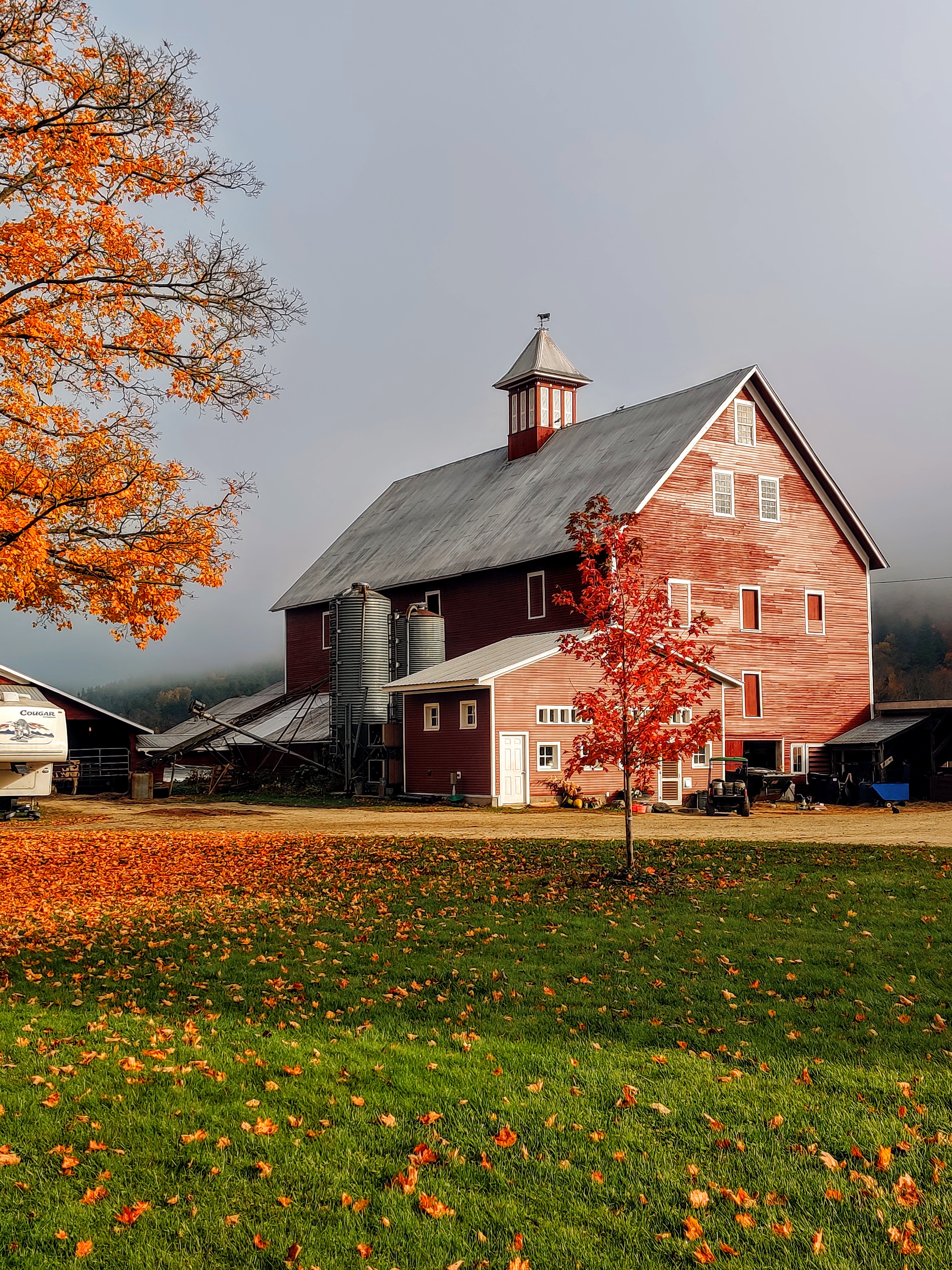
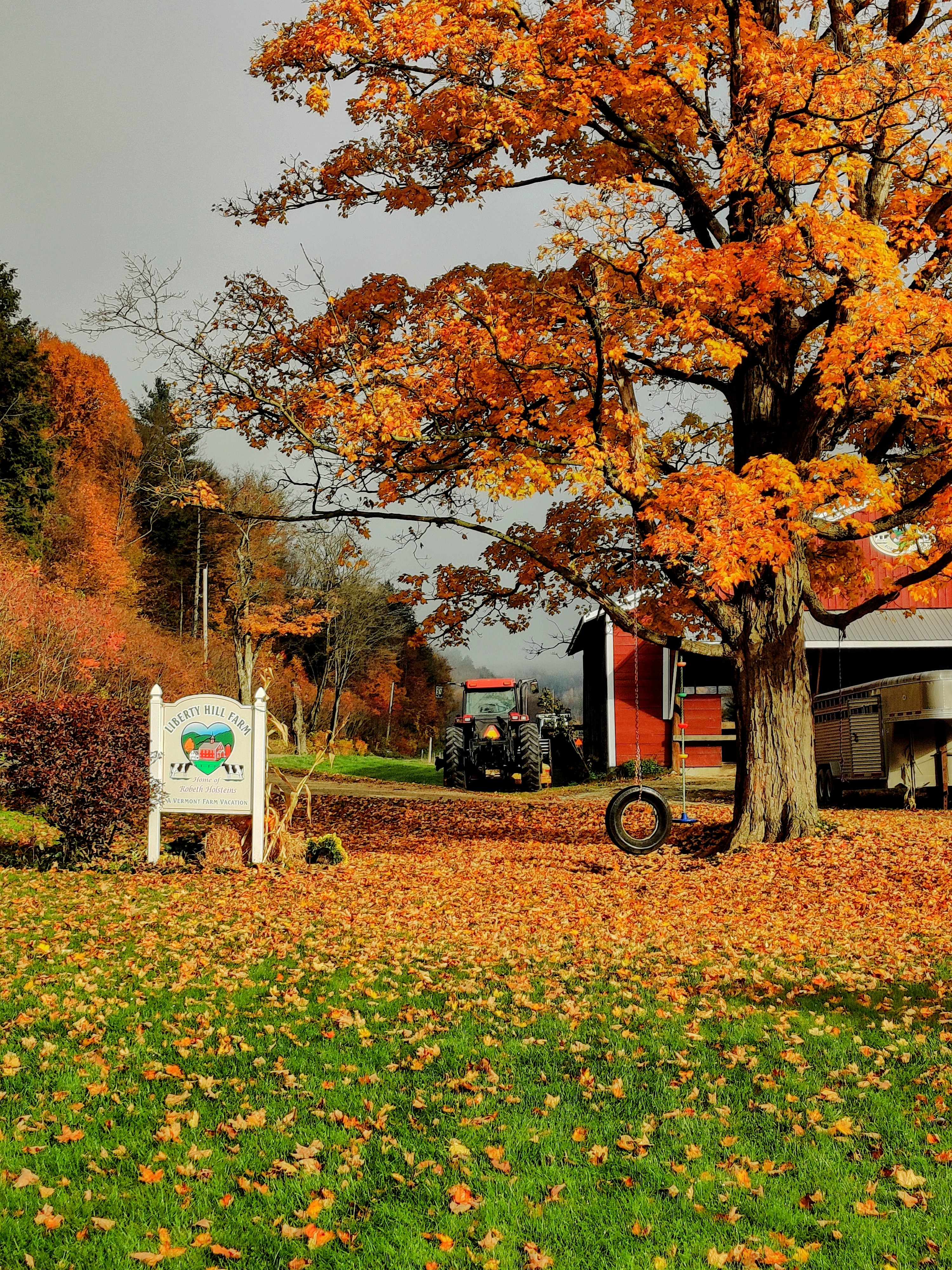
Here is a stat that will give you pause: If 12% of farmers are producing 90% of the food, you can bet the other 88%, like Beth and Bob, are not profitable. That’s why it’s important for you to stay on the farm. Small farms like Liberty Hill Farm & Inn support an American heritage, the small family farm, without raising taxes or food prices. They also provide an experience for the public that creates memories. This is not a hotel–it’s a farm. Beth and Bob are just letting guests visit their lives for a little while. These farm stays offer home cooked meals, community and real farm life experiences.
If you’re looking to escape your iPhones, Androids, TVs to a more organic world, than a Vermont Farm bed & breakfast stay is for you. It brings you back to a much simpler time and connects you with people you otherwise may not have met. My experience at Liberty Hill Farm & Inn will be recounted in the form of short chapters. Each chapter revolves around Beth’s homemade (and renowned) meals we shared with her and other guests at Liberty Hill Farm & Inn, each with a lesson and moment of reflection.
For an abbreviated version of my experience at Liberty Hill Farm & Inn, see my TikTok below:
Chapter 1: A Dane, A Frenchman, A Latina, An Italian, and An American Go To Dinner
Meal: Almond maple chicken, wild rice, carrot souffle (a big hit and super soft and creamy), swiss chard (the last of the harvest), broccoli and brussel sprouts, and warm, soft and buttery cheddar biscuits topped with a layer of Cabot butter.
Liberty Hill Farm & Inn’s historic farm is located in the heart of Rochester in the White River Valley of Vermont. It’s October when I visit and the color of the trees are slowly dimming as winter approaches, but the farm is still very much alive. Cows graze the fields with the Green Mountains in the background. This 240-acre farm has an undeniable charm. The property’s buildings, including a main house and various farm houses, all have a Vermont country feel of days gone by. We pull up to the front of the main house and get out just in time for dinner.
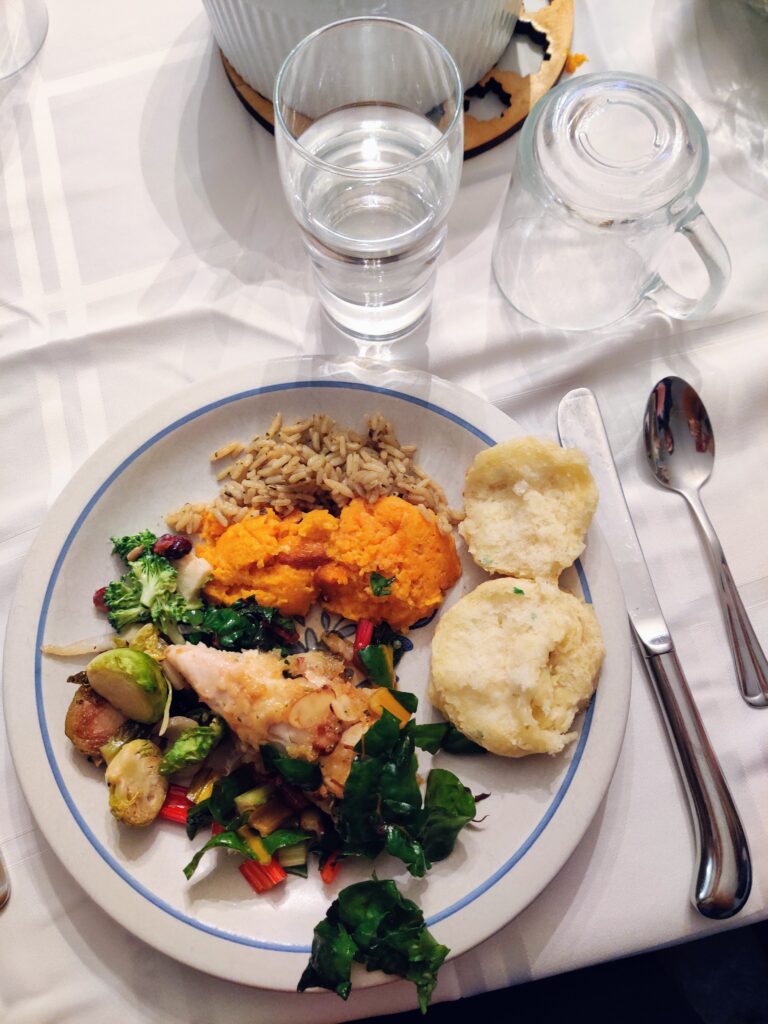
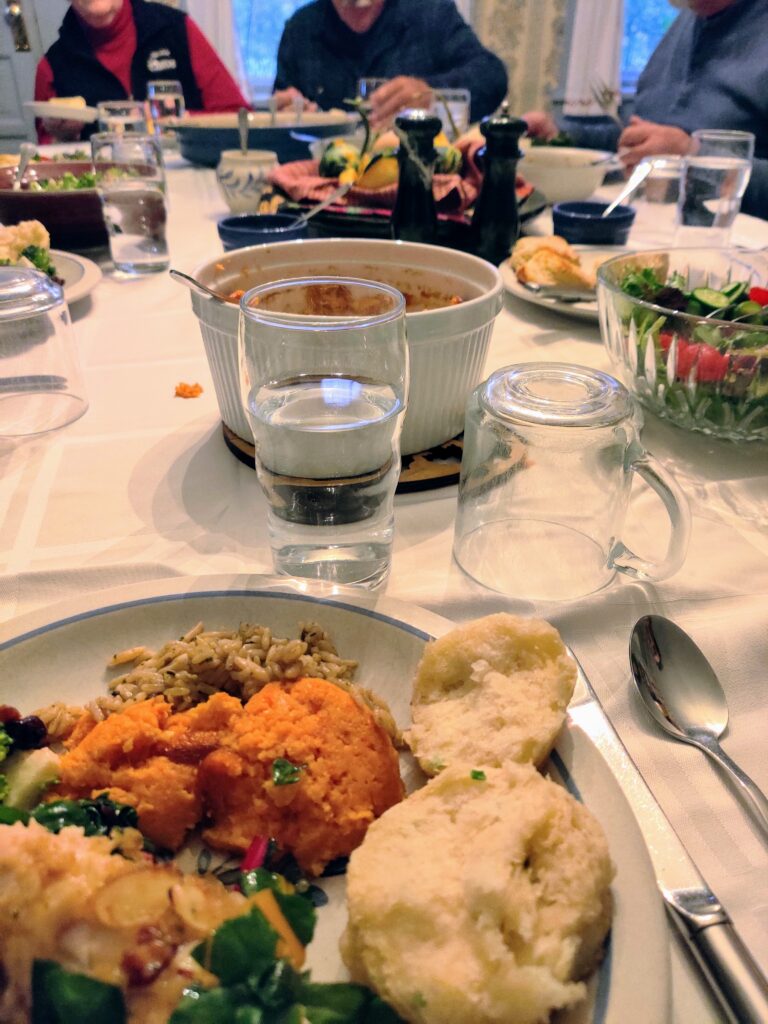
We sat down at the table seated for 8 at 6PM sharp. Ok…we were a couple of minutes late, but gosh did we feel bad about it! The owners and our hosts, Beth and Bob Kennett, led us in grace and the experience and conversation commenced. We weren’t the only guests at Liberty Hill Farm. Tonight there were 2 other couples staying at the property. One couple was from LA – he was Danish and she was Latina. She worked with special ed kids, he owned his own environmental sustainability tech company. How did they end up here? They took a van trip across the US last summer and fell in love with the beauty of Vermont. They decided to come back and ended up at this Vermont Farm bed & breakfast.
The other couple was older and lived in New Hampshire, but were originally from Maine. They were reoccurring guests who had visited the farm on multiple occasions and were close friends of the owners and our hosts Beth and Bob Kennett. He was the man who invented Hannaford’s Guiding Stars for Health program. What I learned most from them though was about Vermont’s huge French influence. I had never put the pieces together, but it all made sense now. The French town names, the amazing food, the even more amazing French food I’ve experienced in the State. But why?
The conversation came about as we were talking about genealogy and where each of us came from. The man from New Hampshire, originally Maine, went onto explain that his last name was originally French, but his ancestors had changed it to sound American because the French were being persecuted (specifically the Acadians or Canadian French) back in the early 1900s. Beth’s family had a similar experience. Her family who lived in Nova Scotia was also French, but was kicked out and had to change their name so they wouldn’t be banished. It was a common occurrence for French people to change their last names while in America to evade being kicked out.
A Quick History Lesson
With Canada being so close to the US border, it’s natural that at some point in history 16 French-Acadian families settled in what is now part of Northern Maine after being driven from their homes by British soldiers. When Maine became a part of the US, a divide occurred. The push to Americanize Maine became strong, in fact so strong that there was a law put in place to expedite the eradication of any ties to French roots and culture. The No French law in 1919 banned the use of the French language in all but foreign classes. If schools didn’t enforce the law, the state would pull funding. Eventually the language dissipated and culture and heritage was stripped away from the people. When the Ku Klux Kan got involved, from fear that the number of French descendants could upset the political status if they revolted, people changed their last names to be more American to avoid any sort of confrontation whatsoever. By the time the No French law was removed in 1961, it was too late.
More people in the Northeast have French roots than you may think and it’s reflected in the culture, food, and way of life. Have you ever thought about how Vermont got it’s name? Similar to the Grand Tetons – named le grand tetons or big breasts in French because of the shape of the mountains – Vermont is a French toponym. Samuel de Champlain explored North America on behalf of French king Henry IV in the early 17th century – he also founded Quebec City. When he first set foot in the mountainous region, he named it Verd Mont, which in French literally translates to “Green Mountain.” Vermont originally belonged to New France, the colony stretching from Labrador to Louisiana and across the Rocky Mountains, and was eventually conceded to Great Britain who anglicized it to “Vermont.”
Chapter 2: A Tea-rrific Story
Meal: Post-dinner tea.
I sat and pondered all the connections that I was making in my head over a cup of post-dinner tea. Why of course! Duh, how had I not pieced this together. It seemed so obvious. The Dane, the Italian, and the Vermont and Mainers were even more alike than I had thought.
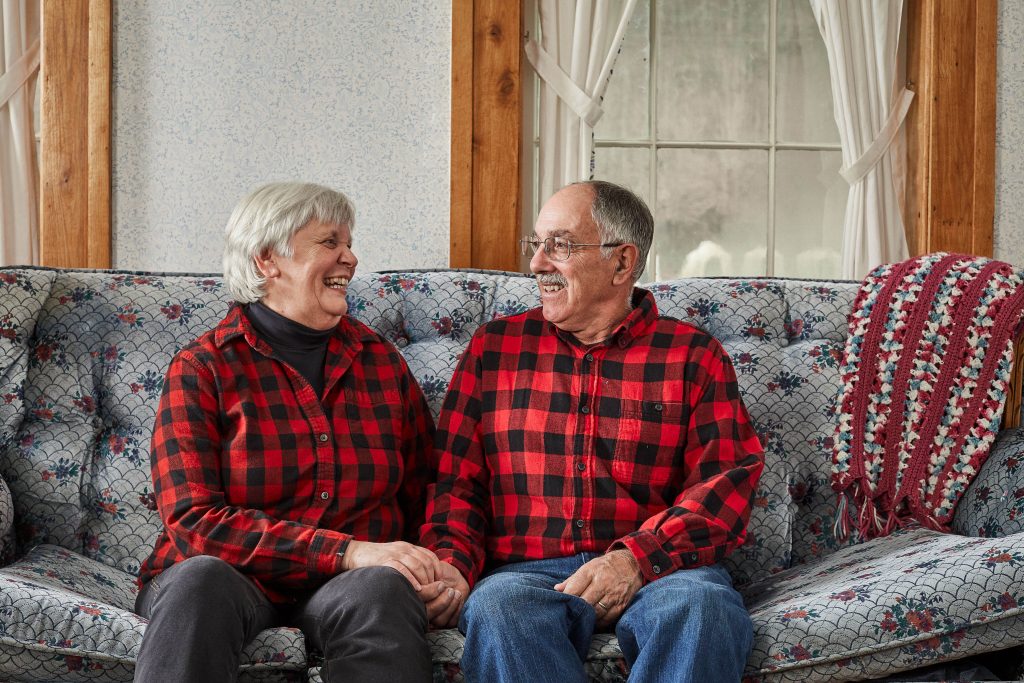
I shifted my thoughts to wanting to know more about Beth and Bob. Beth’s family were dairy farmers since the mid-1700s in Maine. Bob was from New Hampshire. When he returned from the Marine Corp he was looking for work. He too had come from a dairy farm and found work on Beth’s family farm. The rest is history…On their honeymoon they drove by Liberty Hill Farm & Inn, but at that time it wasn’t for sale. They said a prayer asking God that if they could have one thing, they would love for this farm. No joke…the Lord answered their prayers. 4 years later they were looking for a farm in the same area and a real estate agent told them they had to come see this plot of land near Rochester. When they showed up, it was none other than Liberty Hill Farm. What a story!
I went on to ask some questions about how this concept of a Vermont Farm Bed & Breakfast came to be. Every agriculture business has one family member who brings in income for the family from an outside business to support the family. As mentioned earlier on, dairy farming is not a profitable business when 12% of farms make up 90% of the business. Small dairy farming is a business that gives back to communities, but is expensive, physically and mentally difficult, time-consuming, and difficult to profit from given the immense competition. But it’s essential. Without them, we wouldn’t have the products we easily shop for from our Whole Foods or Trader Joes or Walmart with ease, without even thinking about the work that goes into producing these foods or the source. In Liberty Hill Farm & Inn’s case, Beth and Bob’s Vermont Farm Bed & Breakfast is that external business and their kids are following in their footsteps.
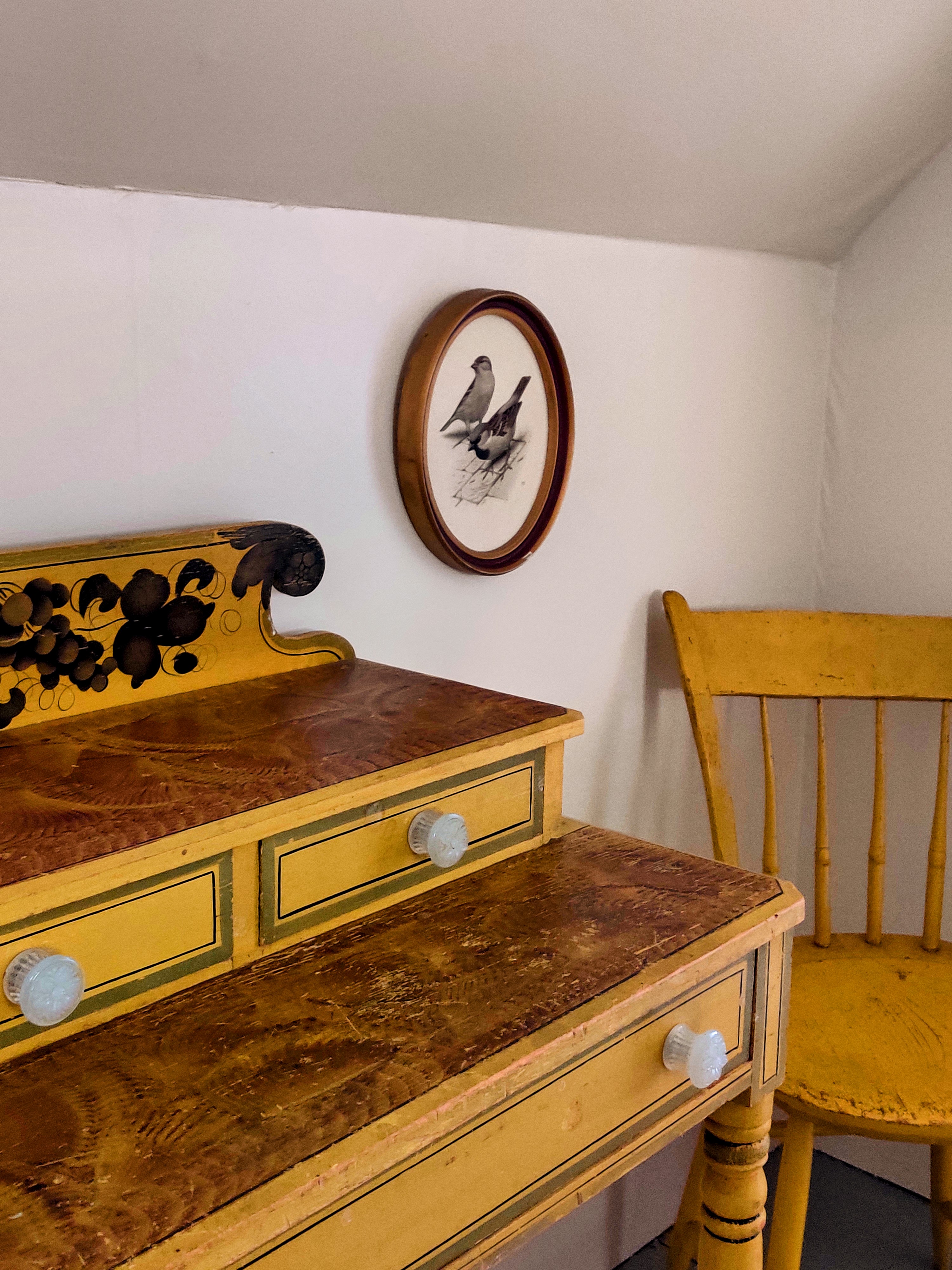
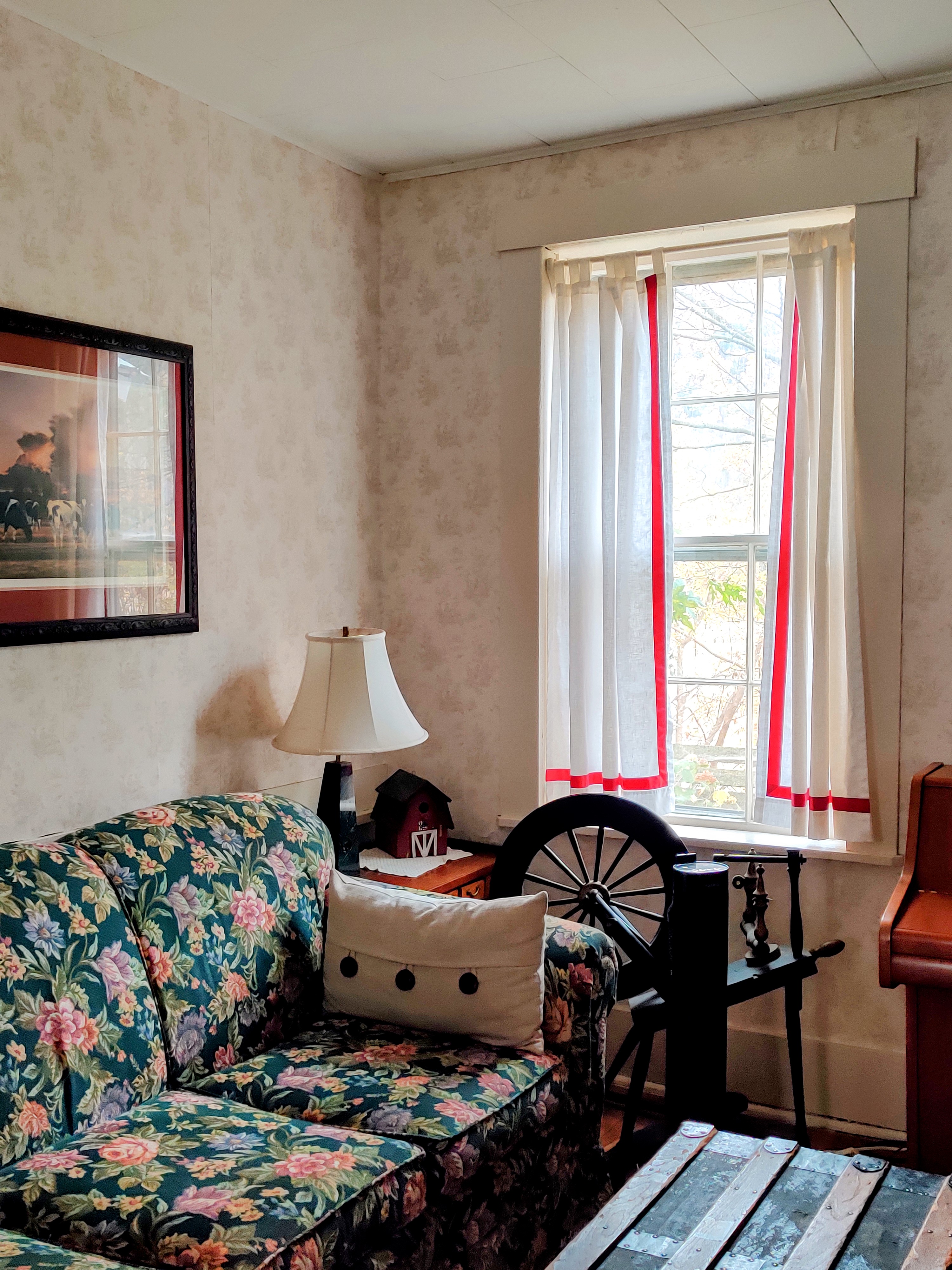
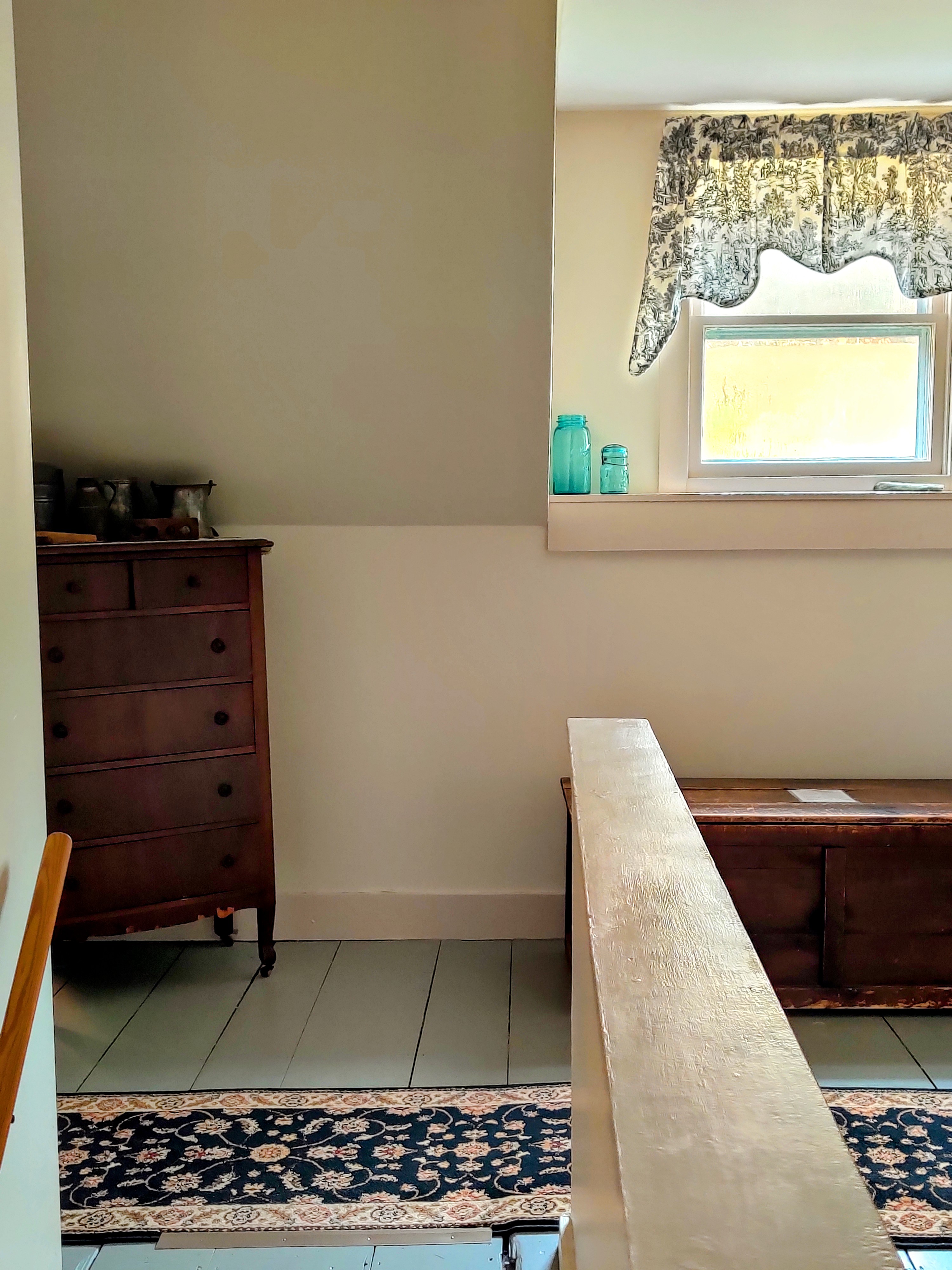
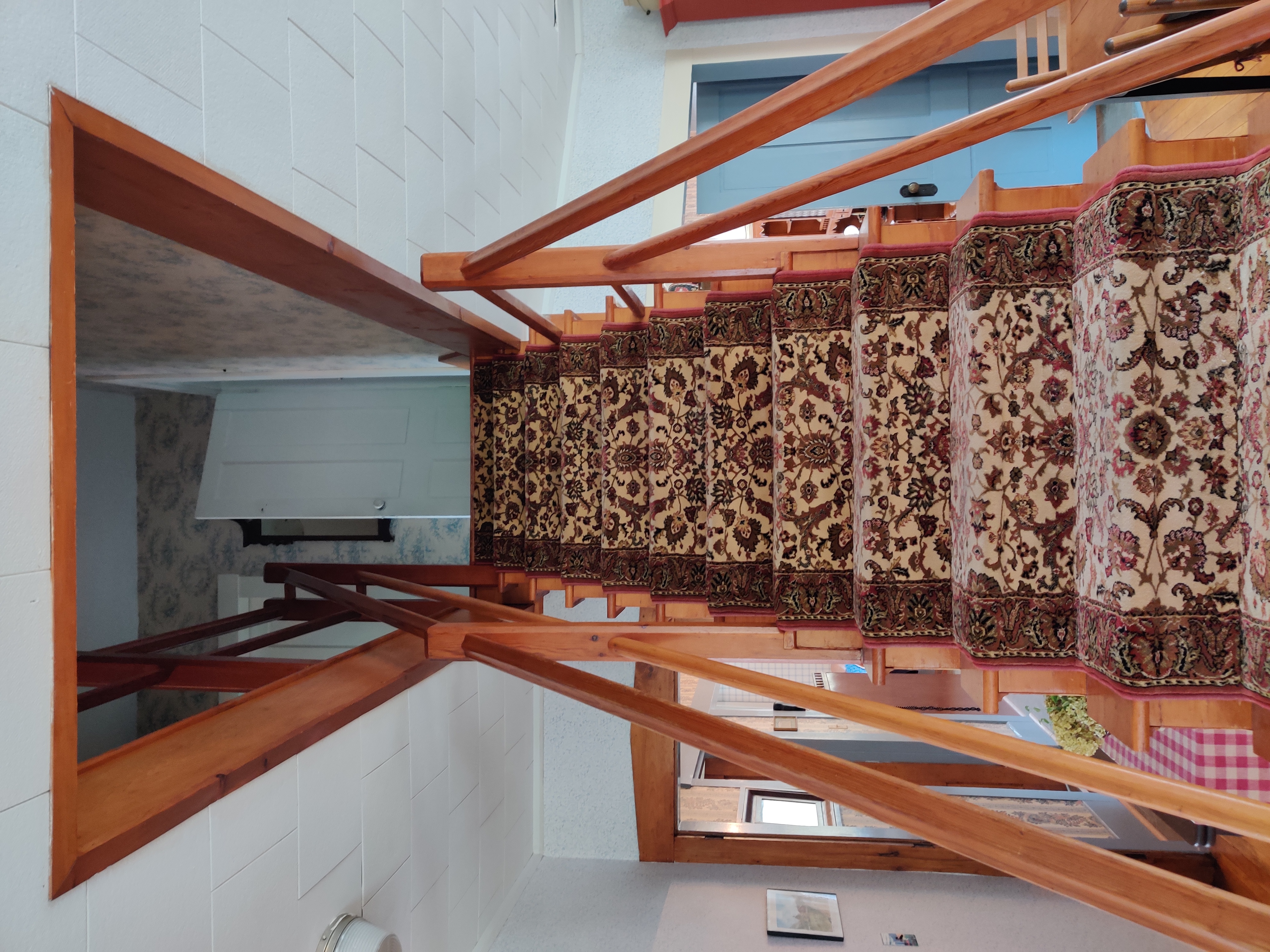
Since Liberty Hill Farm & Inn is located in the White River Valley, it is perfectly centralized between all the best Vermont ski mountains: Killington, Sugarbush, Stowe and Mad River. Liberty Hill Farm & Inn has been hosting people since 1984. Before condos and hotels built up places near the mountains, ski clubs and lodges used to be located in the valley. One of those lodging places was Liberty Hill Farm & Inn. Today, people still stop by their property for cross country skiing since there is a lot of terrain in their area, but the business they used to get from skiing has now diminished. So they turned to making it a Vermont farm bed & breakfast that offers and educated guests on the true farm way of life.
Chapter 3: Udderly Delicious Pancakes That Lift Your Moo-d
Meal: Custard rhubarb, pancakes, yogurt, homemade apple sauce, Vermont maple syrup and sausage.
Breakfast starts at 8AM on the dot. That’s an early start for Patrick and I, especially when on vacation. But for the farmers, it’s a late start since they’ve been up all morning getting the job done. The morning was family affair, in addition to guests, some of Beth and Bob’s family joined us for breakfast. Beth and Bob’s son David, popped into say hello in between jobs, but his wife Asia (pronounced Asha) and their son Henry spent the morning with us.
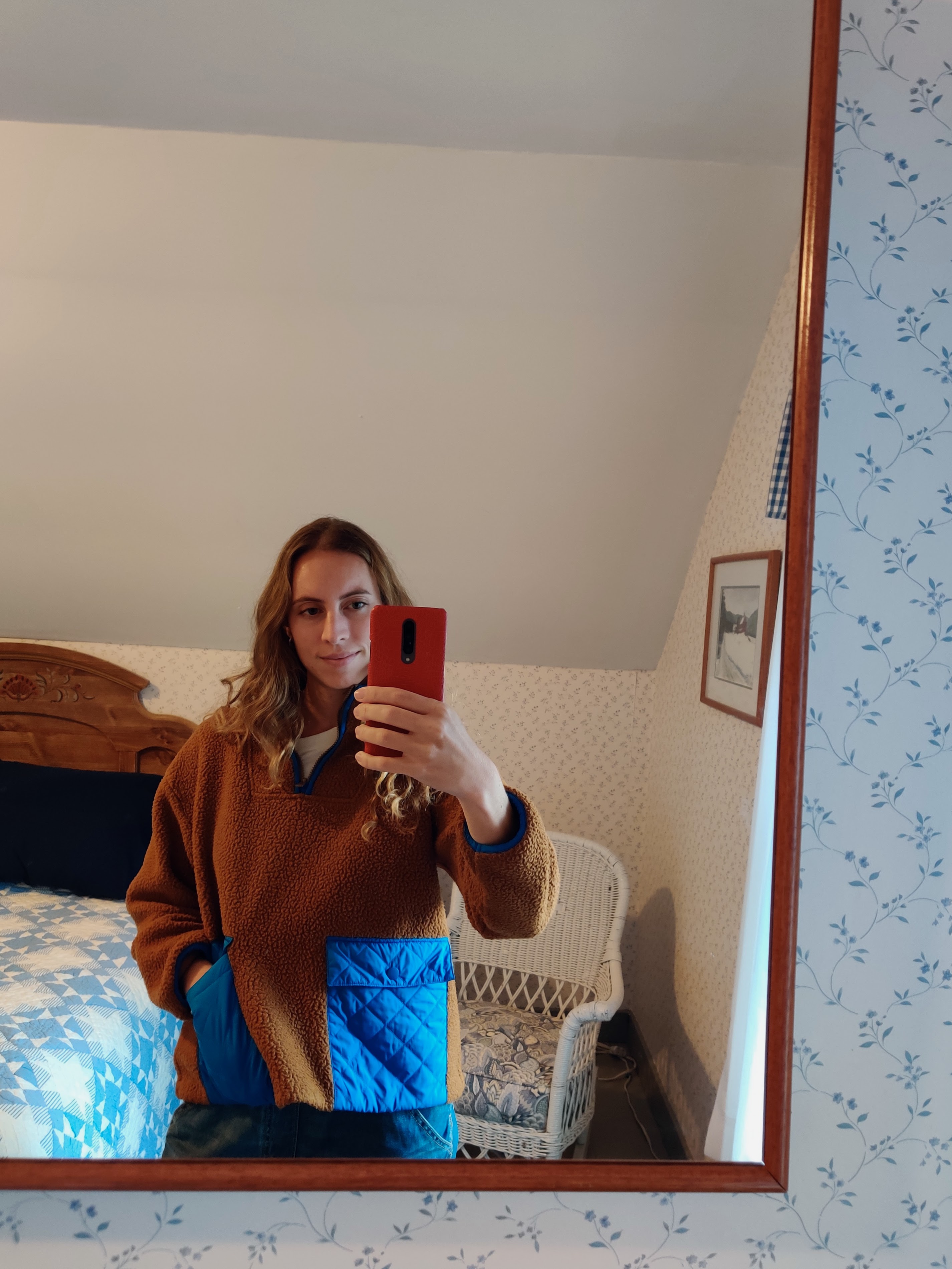
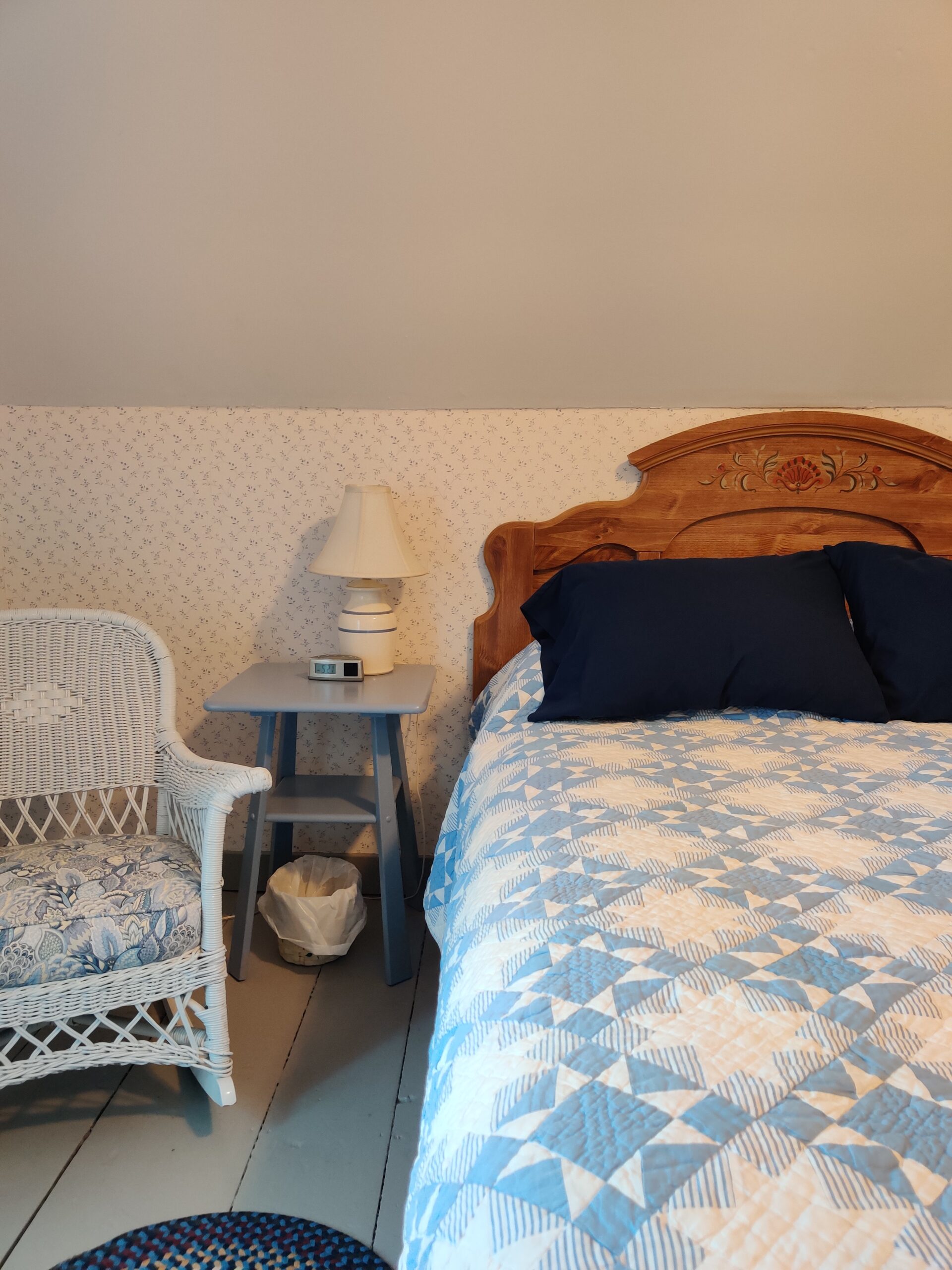

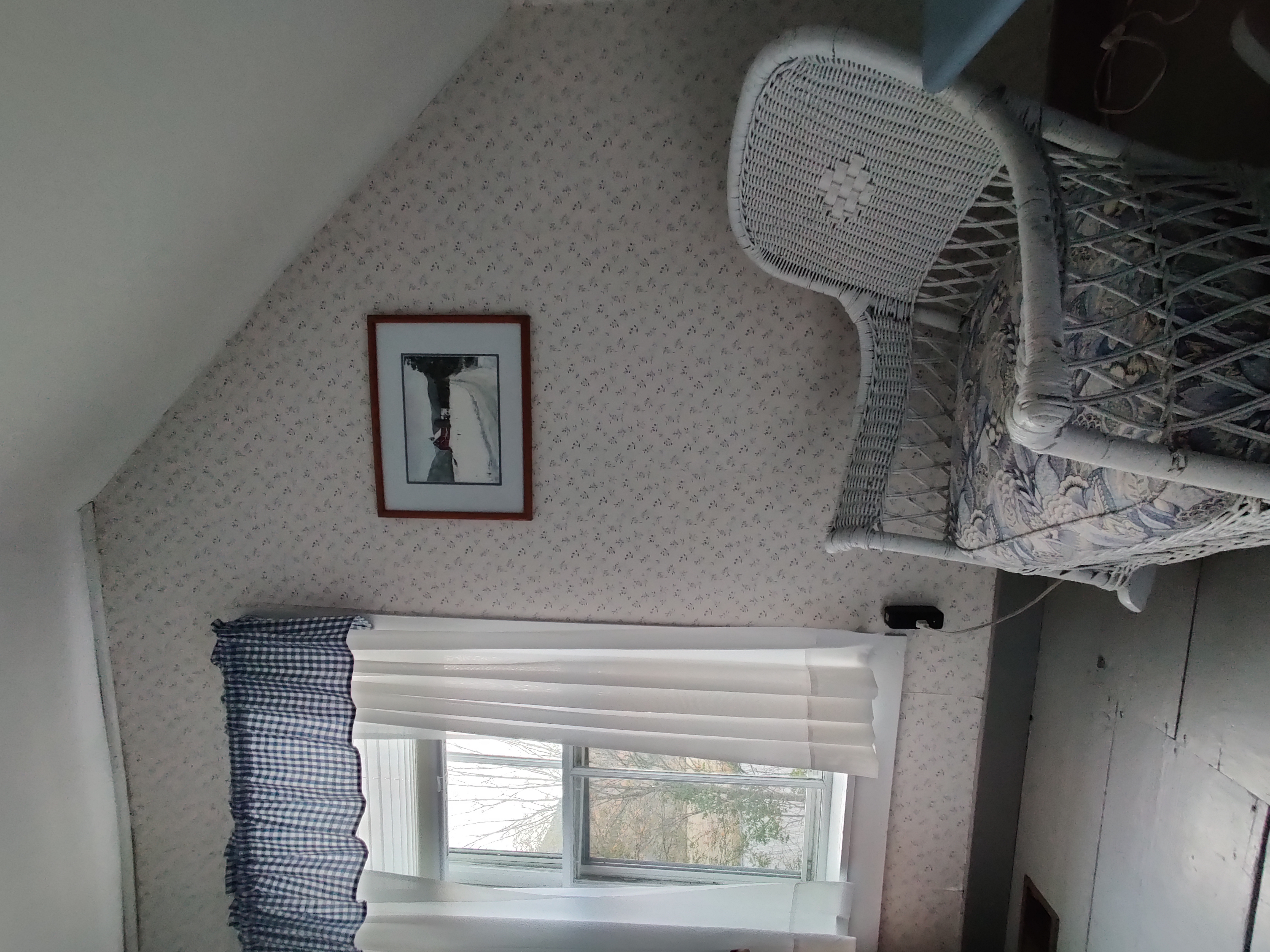
Asia is Polish and has 4 kids together with David. She’s in charge of helping out on the farm and leading tours who want to experience the farm. She is super into goats, so has some on the farm. They’re not dairy goats though, they’re just goats for fun, to enjoy and hang out with. We spoke with her for a while in the morning and talked about some of the different friends they had in the area. I was surprised by how much of a global area the remote town of Rochester really was. You feel like you’re in rural America, but up the road you have Russian Ukraine friends, Asia herself is Polish, they hosted a kid from Sweden for a month for several summers in a row, a young woman and later her cousins from Switzerland, and the list goes on of international students they’ve hosted. Liberty Hill Farm & Inn is a global destination, it’s not just for locals.
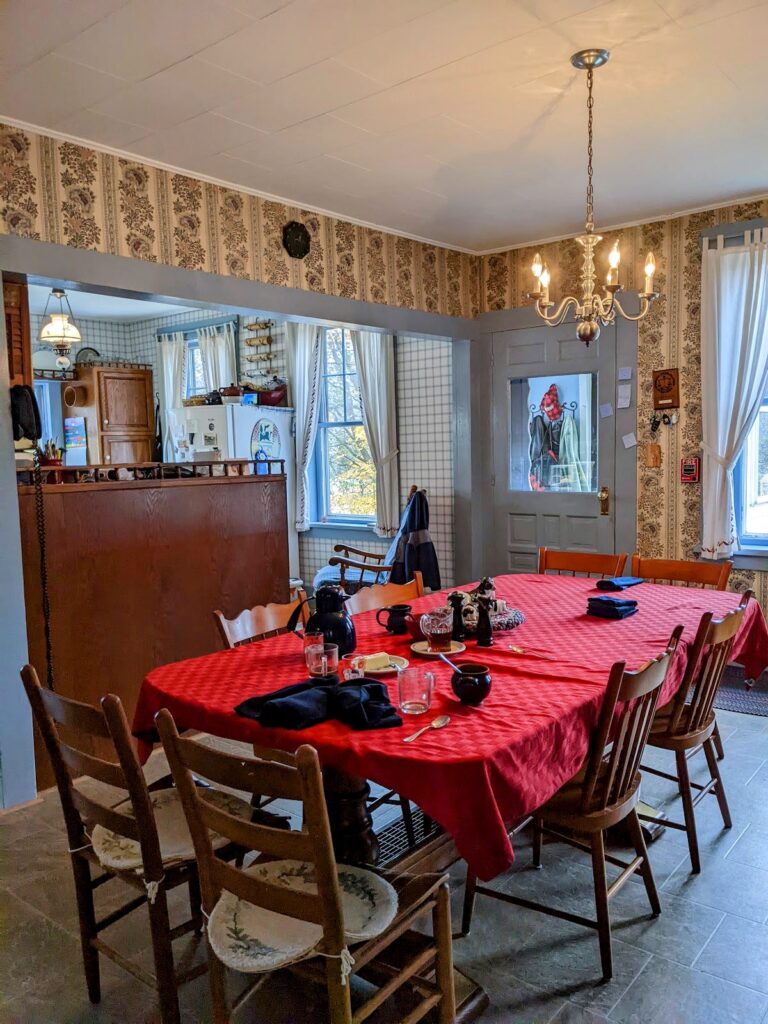
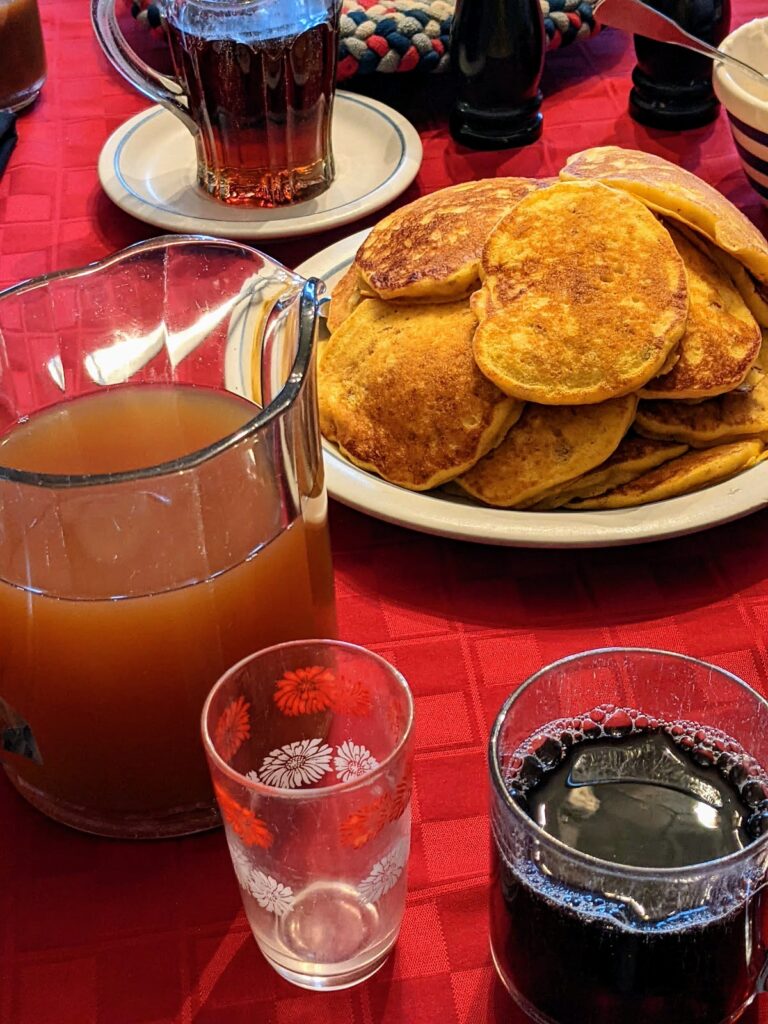
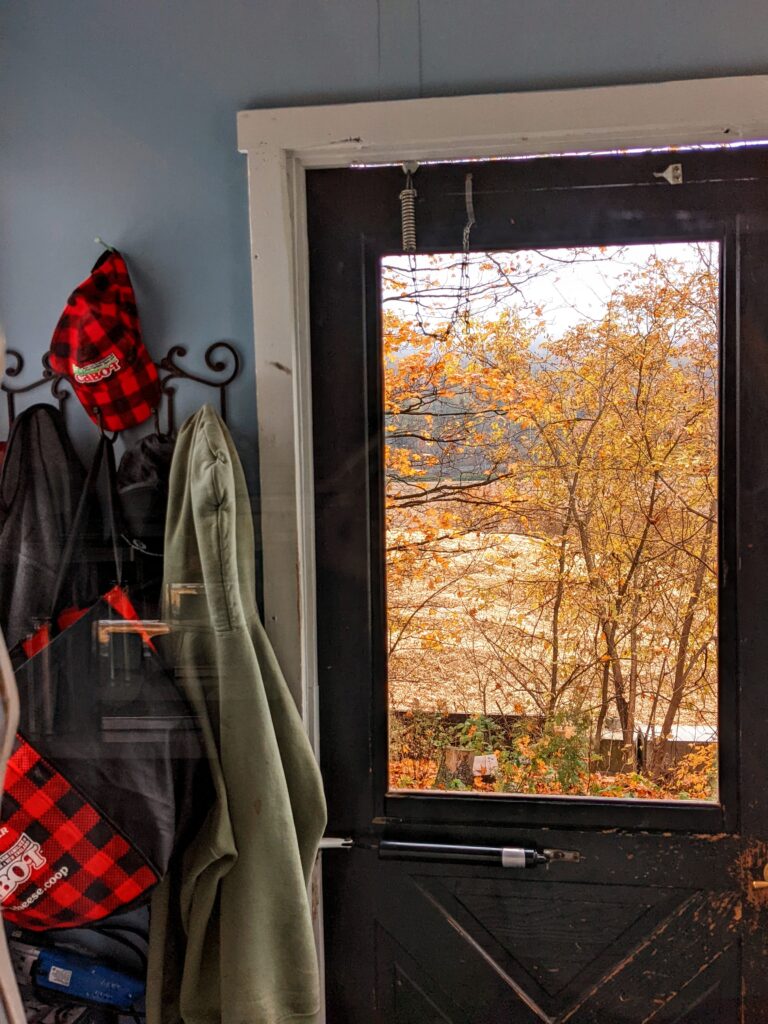
Beth and Bob are part of the Cabot Co-op. They are one of a 800 farm families in the Northeast and upstate New York that contribute dairy to the Cabot dairy products you consume. All the dairy produced on property is sold for Cabot to use in yogurts, milk, butter, cheese, and so on. They also sell male cattle to other farms to reproduce. Liberty Hill Farm & Inn has 110 cows and over 120 calves born a year. Do the math…that’s 1 every 3 days. If you stay at the property for a 3 day time span, you will witness a calf being born. The birth can last anywhere from 30 minutes to several hours. Beth and Bob have been doing this for 49.5 years. They’re legitimately a maternity ward at the rate they churn out calves! And that’s on top of all the other day-to-day labor. Once calves are born they are separated from one another to ensure they don’t spread diseases should one be sick.
And yes — you are able to pet and feed the calves that were born literally just days before your arrival!
Sustainable Efforts Generated From Cow Milk – I Kid You Not!
Just in case, like me, you didn’t piece this together because your so simple minded and only think about when you pull milk straight out of the fridge in a grocery store: Milk is hot when it’s milked directly from the cow. In fact, there has been progress made in the sustainability realm for how to make use of the cows hot milk. The energy from the cows’ milk goes through a heat exchanger to heat the water to wash the milking equipment so they no longer need to use propane. It is a totally renewable energy cycle.
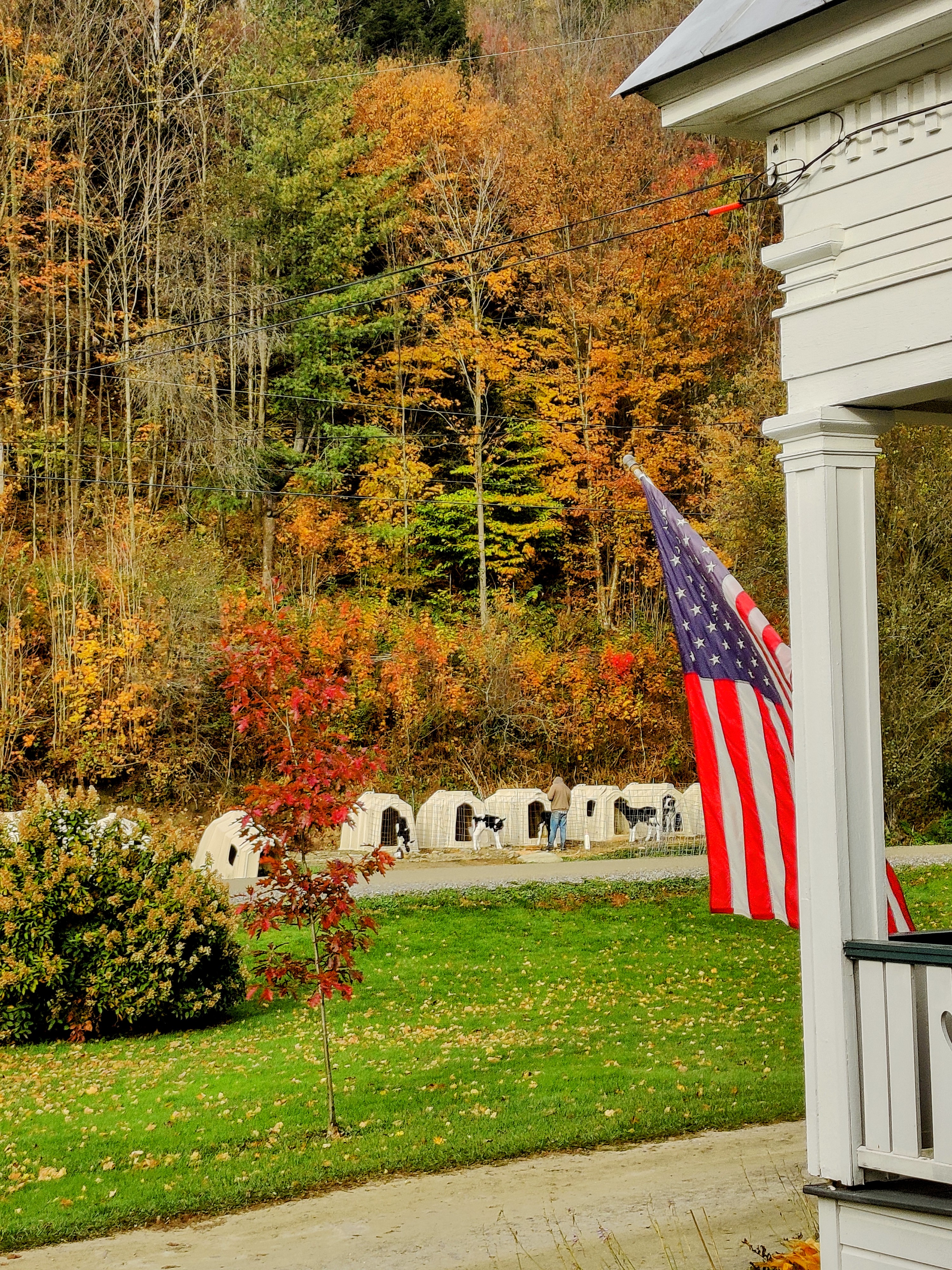
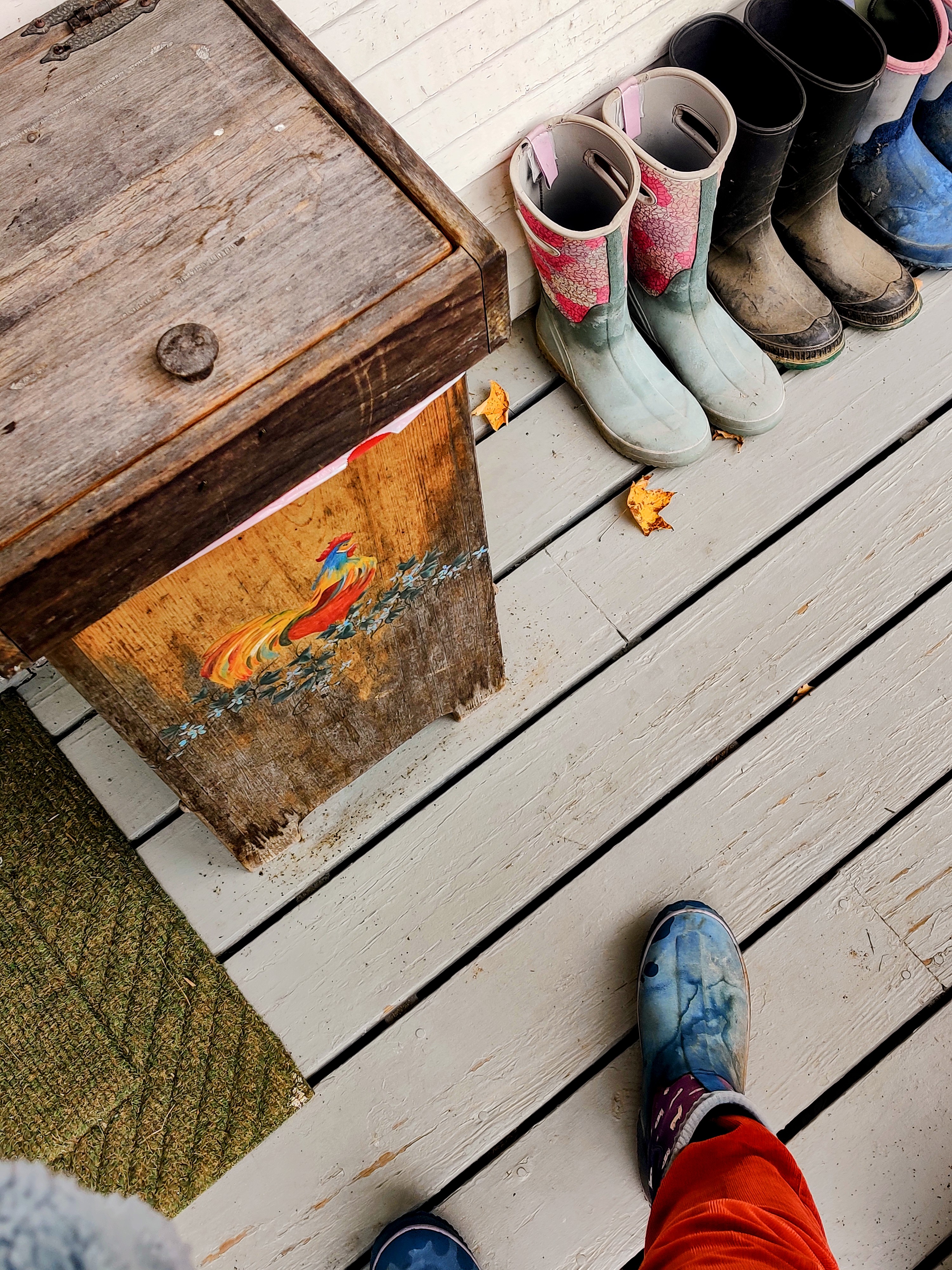
Asia gave us a tour of the farm after breakfast. We went out to where the cows were being fed. There are several cows out front grazing the field when you first drive in, but those are the “vacation cows.” The cows in the pasture are there in the last stages of their pregnancy (8th and 9th month of their gestation period). It’s a maternity leave in Advance of the birth of their calf. An interesting fact that Asia taught us is the important of cow nutritionists or animal nutritionists. They need to make the food exactly the same way every day. If they don’t the cows won’t eat it. They are one of the pickiest animals, very similar to cats they say. The food they are fed is full of the equivalent of cow prenatal in grain, hay, magnesium, calcium etc. A machine weighs the weight of each ingredient every day to ensure that the same amount is put into the food and to ensure that they eat a certain amount every day, in this case, 15,000lbs of feed a day for the cows. And while it may sound easy to just mix up a batch in a machine and go, it takes 3-4 hours to prep food for the cows every day.
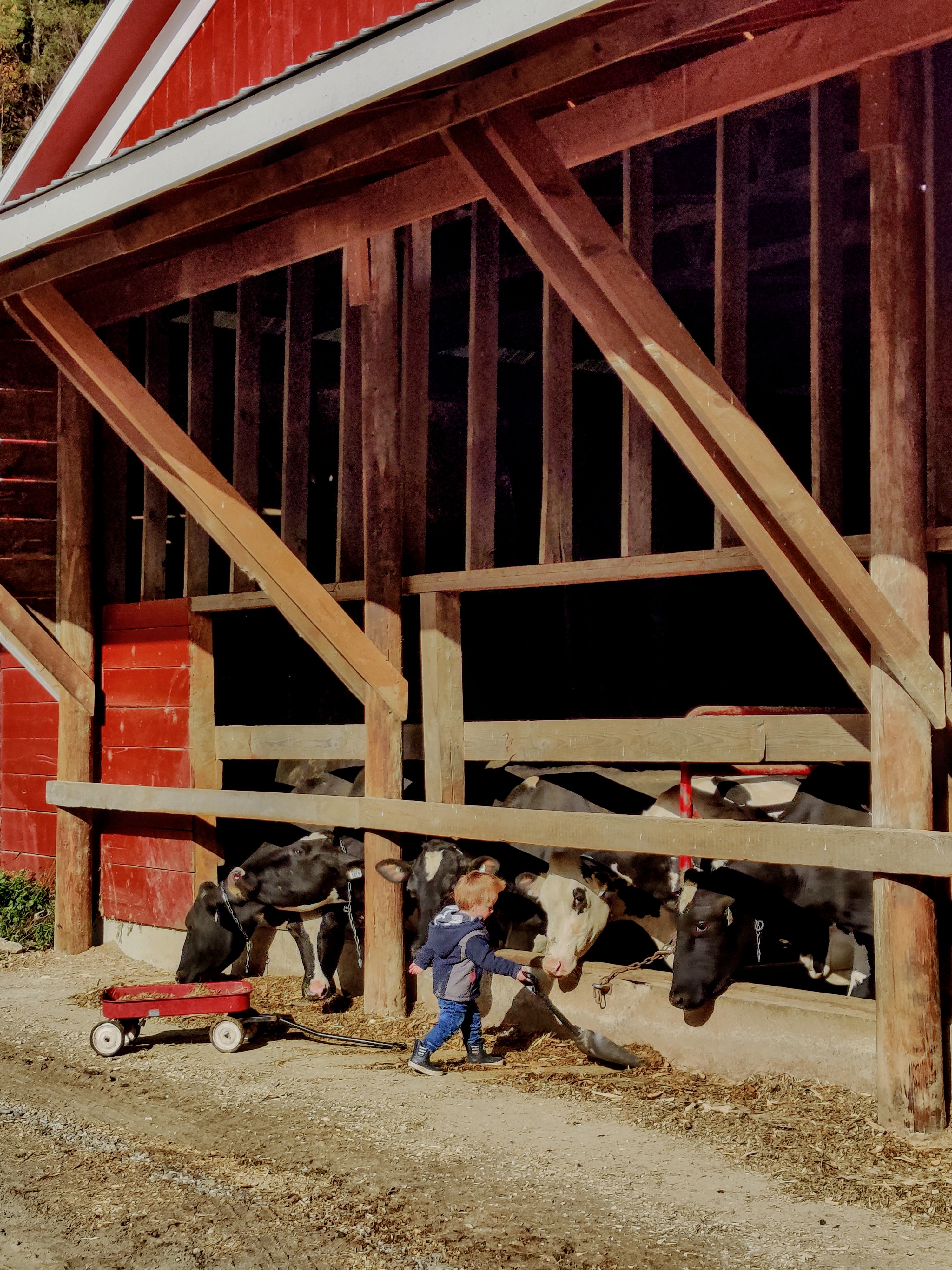
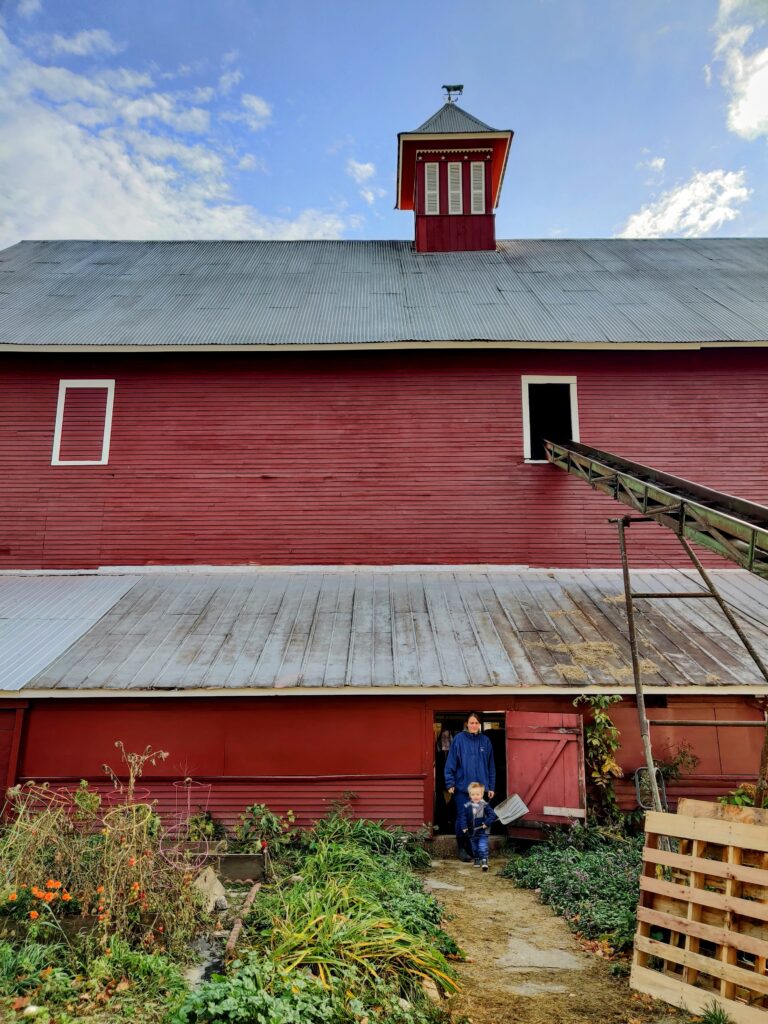
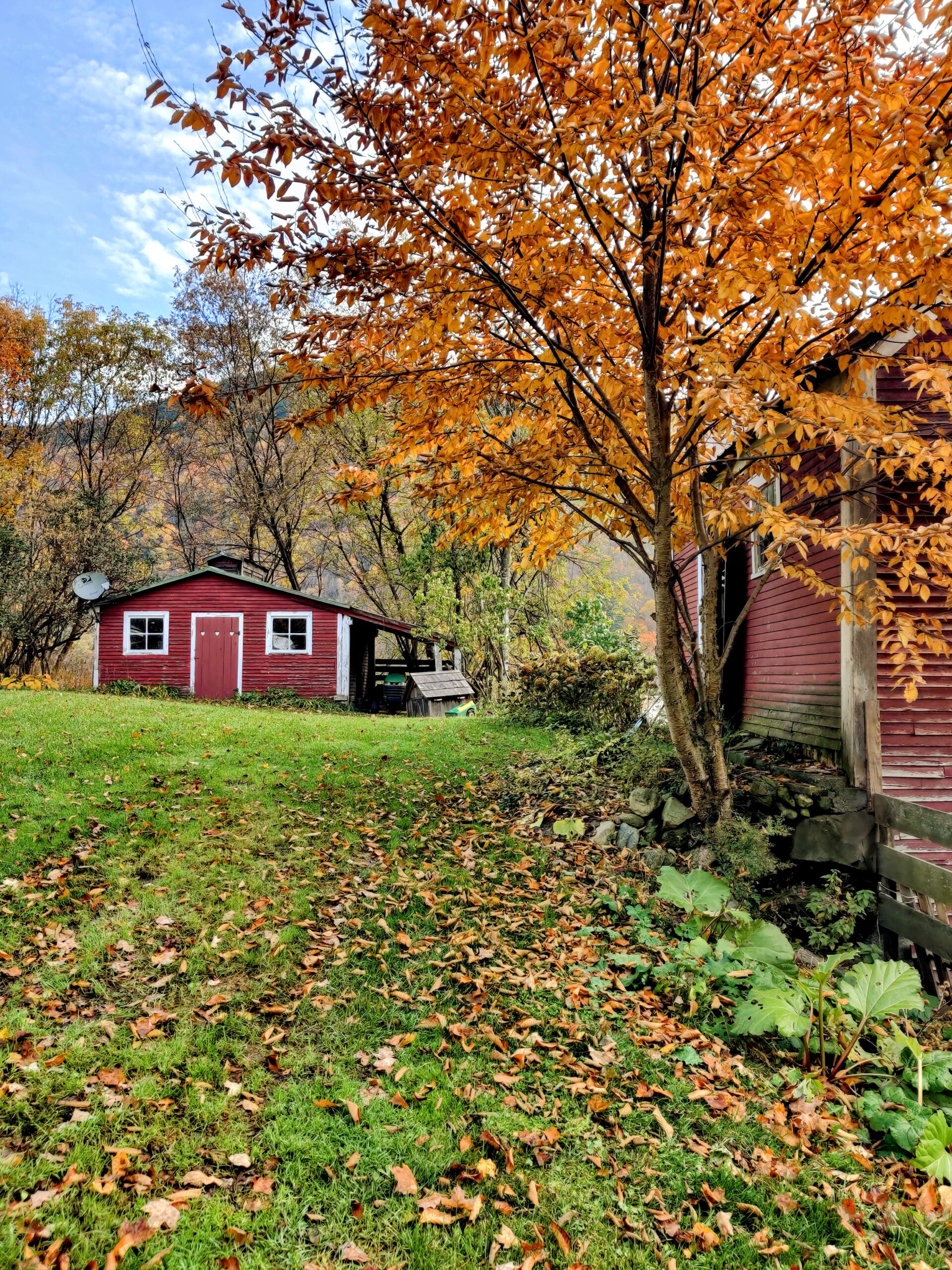
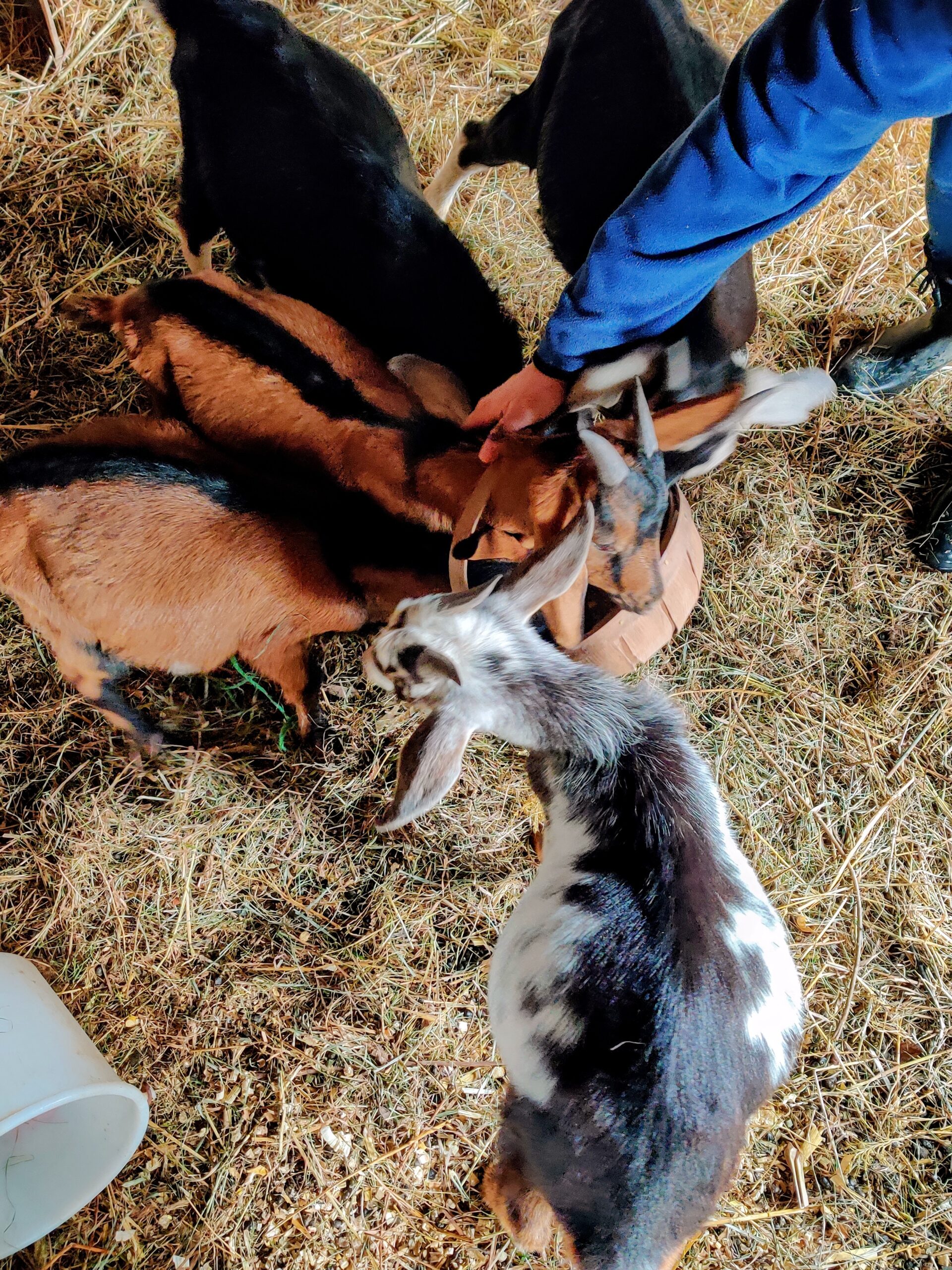
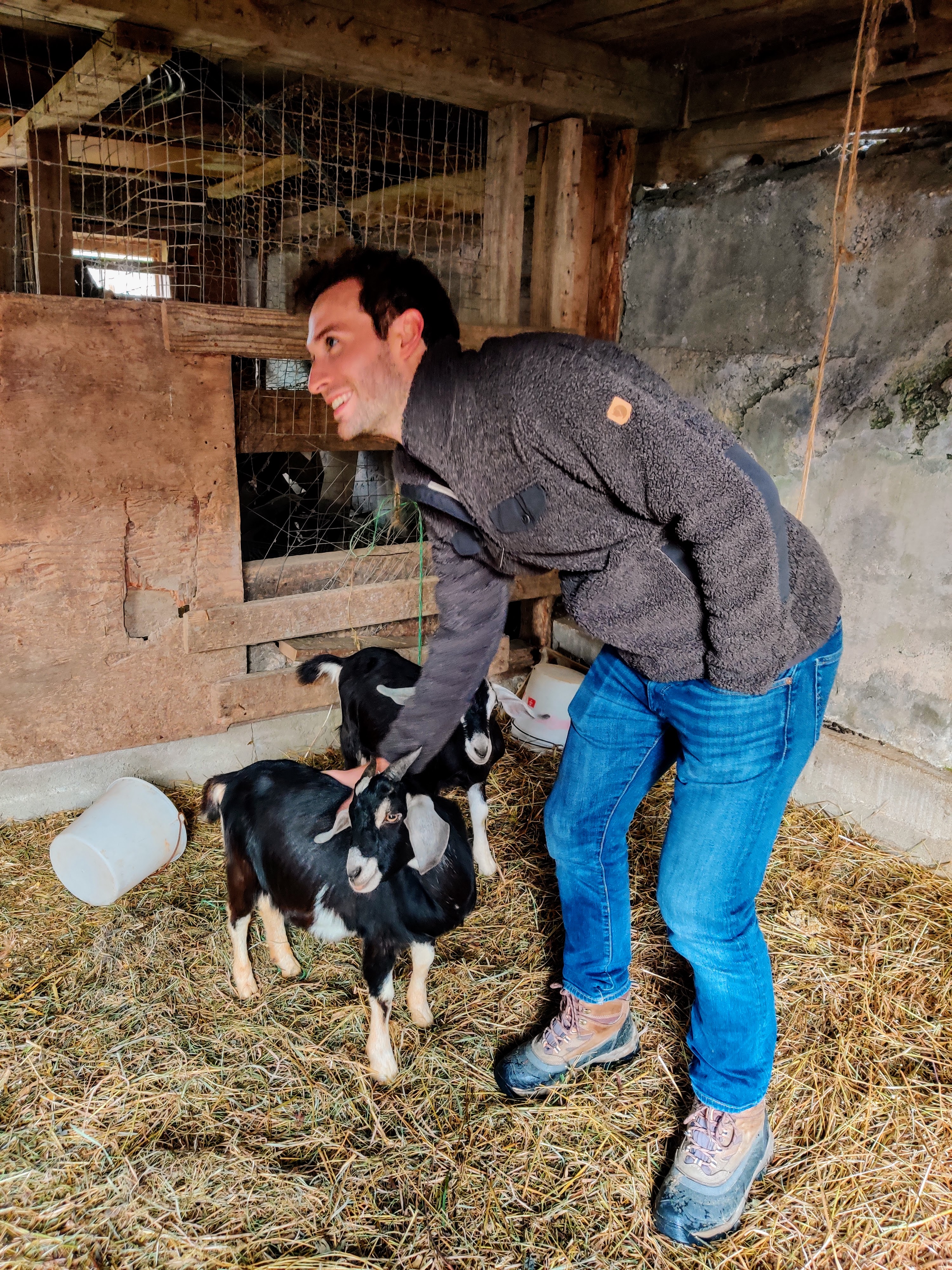
We took a look at the milking area in the barn, you’ll see that they’re still using traditional milking techniques from the 1950s. Old school, I love it! I called out how some of the cows were sitting and Asia mentioned that it’s actually dangerous for cows to sit for longer than 4-6 hours because of circulation. Cows are so heavy that they could die from stopping their circulation and not being able to get back up. That’s why all farmers have emergency harnesses to help get cow’s back up in case they run into that situation. It’s rare, but it can happen…
Do You Have to Milk Cows? What If We Left Them Alone?
Milking cows need to be milked, aka relieved, every 12 hours. If you don’t, they will die from not being relieved. This doesn’t apply to all cows, but because Liberty Hill Farm’s cows are milking cows, not beef cattle, it is imperative for them.
We headed over to some of the older calves and a pleasant surprise…there was a litter of kittens! I was surprised there was no dog around, but it was full of cats. The cats are there to ward off mice and they’re very mischievous. The kittens aren’t afraid of the cows and pounce on their noses when playing with them. A dog isn’t necessary because they’re not herding the cows anywhere and because there aren’t really any predators that are dangerous to the cows. Yes, they do get bears and coyotes, but they don’t attack the cows. The bears eat their corn crop. Liberty Hill Farm always plants an extra 5 acres of corn crop since that’s how much on average gets lost to bears since they’re herbivores. I love how they’re thinking about the well-being of the bear by giving it food rather than using harsh methods to scare it off! Coyotes on the other hand eat the compost of the dead cows if they die of natural causes, but they don’t want to meddle with the live ones.
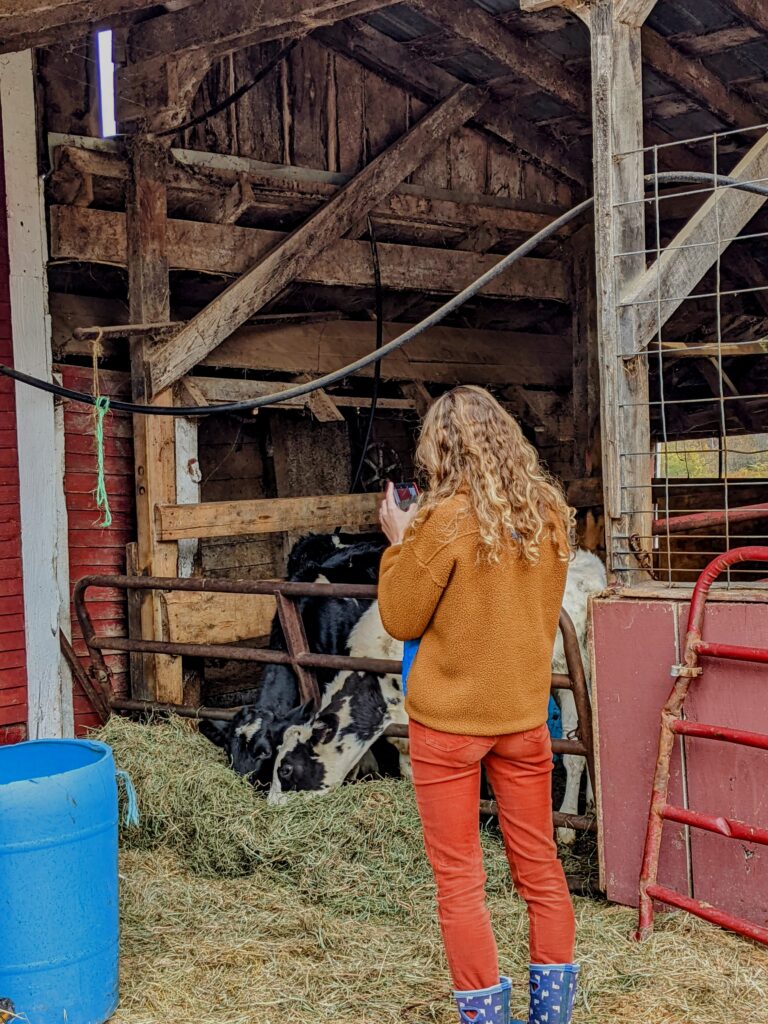
Do Farmers Care About Daylight Savings?
The old myth that daylight savings has stuck around this long for farmers is not true. When I asked Beth and Bob about how they felt about daylight savings possibly being removed they said they didn’t have an opinion. There’s technology now a days, there’s electricity, there are lightbulbs. They don’t need to milk in the dark anymore. Daylight savings doesn’t impact them.
Chapter 4: A Legen-dairy Experience
Meal: Ham, carrots with maple syrup and cranberries, beans, kombucha squash (a Japanese squash), carrot cake 🍰, and pumpkin biscuits.
Beth’s farm and nearby local farmers supply all the fresh vegetables, herbs, meat, and fruit for guest meals. The hen houses provide fresh eggs for the kitchen and breakfasts. A self-described steward of her land, Beth’s interest in organic lifestyle stems from her upbringing. The highlight of a stay at Liberty Hill Farm & Inn is the the delicious homemade meals. In the kitchen designed for feeding just one family, Beth began cooking dishes she’s been experimenting with since she married Bob.
When I asked if they were family recipes, Beth laughed. “No, not at all, my mother didn’t even cook! She didn’t have time on a working farm.” Her recipes started when Bob gave her a Betty Crocker cookbook when they got married. And well, she got lucky that as she experimented with food, Bob had an excellent palate! Today her recipes can be found in the Cabot Creamery Cookbook, a cookbook that sources recipes from various Cabot Creamery farms. When I asked if Bob still tested out her cooking, I found out another incredible story. All I can say is…the Lord truly is watching over this couple! Bob is 72 and is still out on the farm laboring every day like a 28 year old young man. However, a few years back he had a terrible accident. He had a condition where he would occasionally get dizzy and pass out. One day he had an episode, feel from a tractor and broke his neck. By the graces of God, he did not remain paralyzed, but he did lose his sense of taste and smell. Today, she tests her meals on guests.
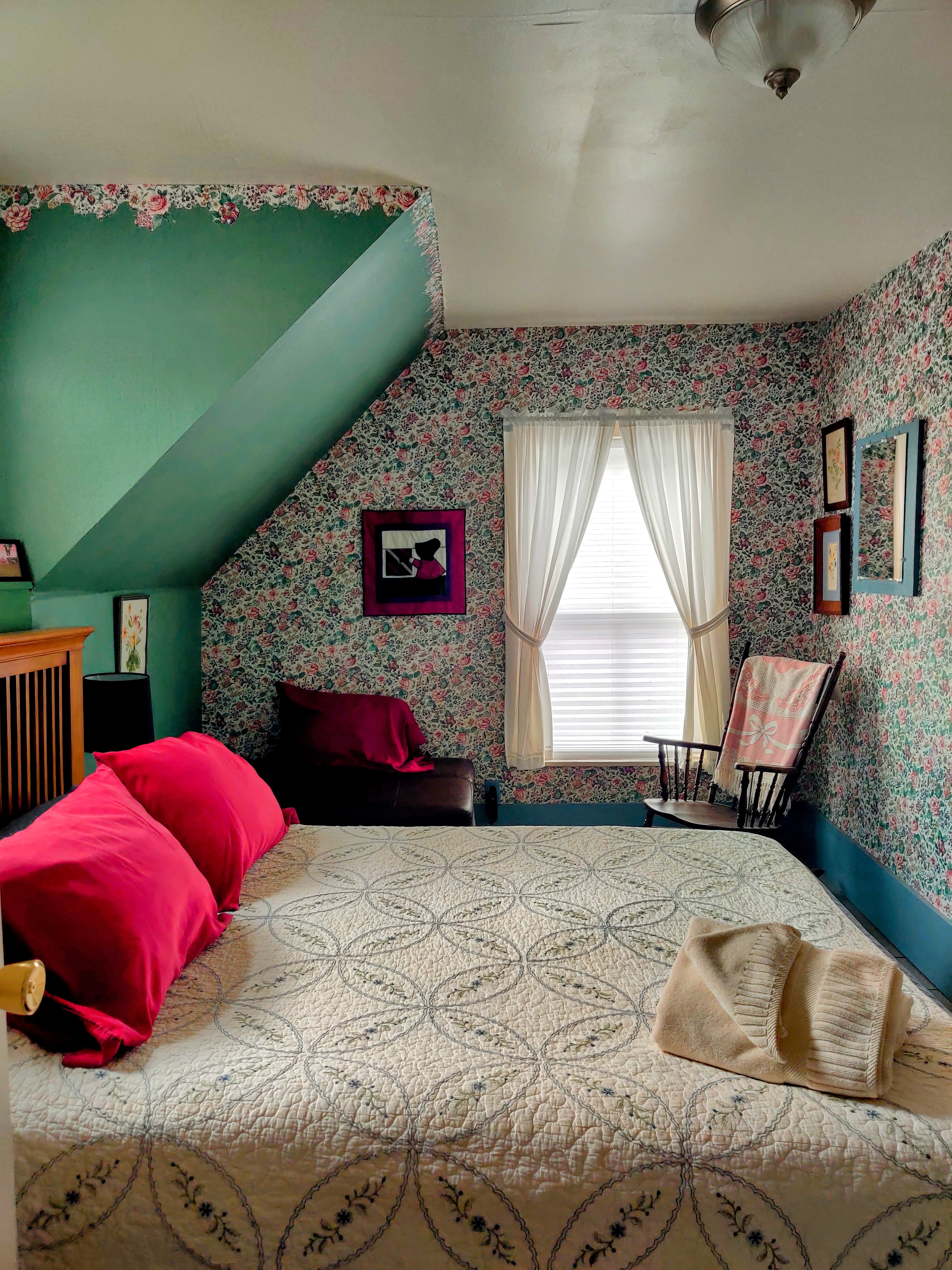
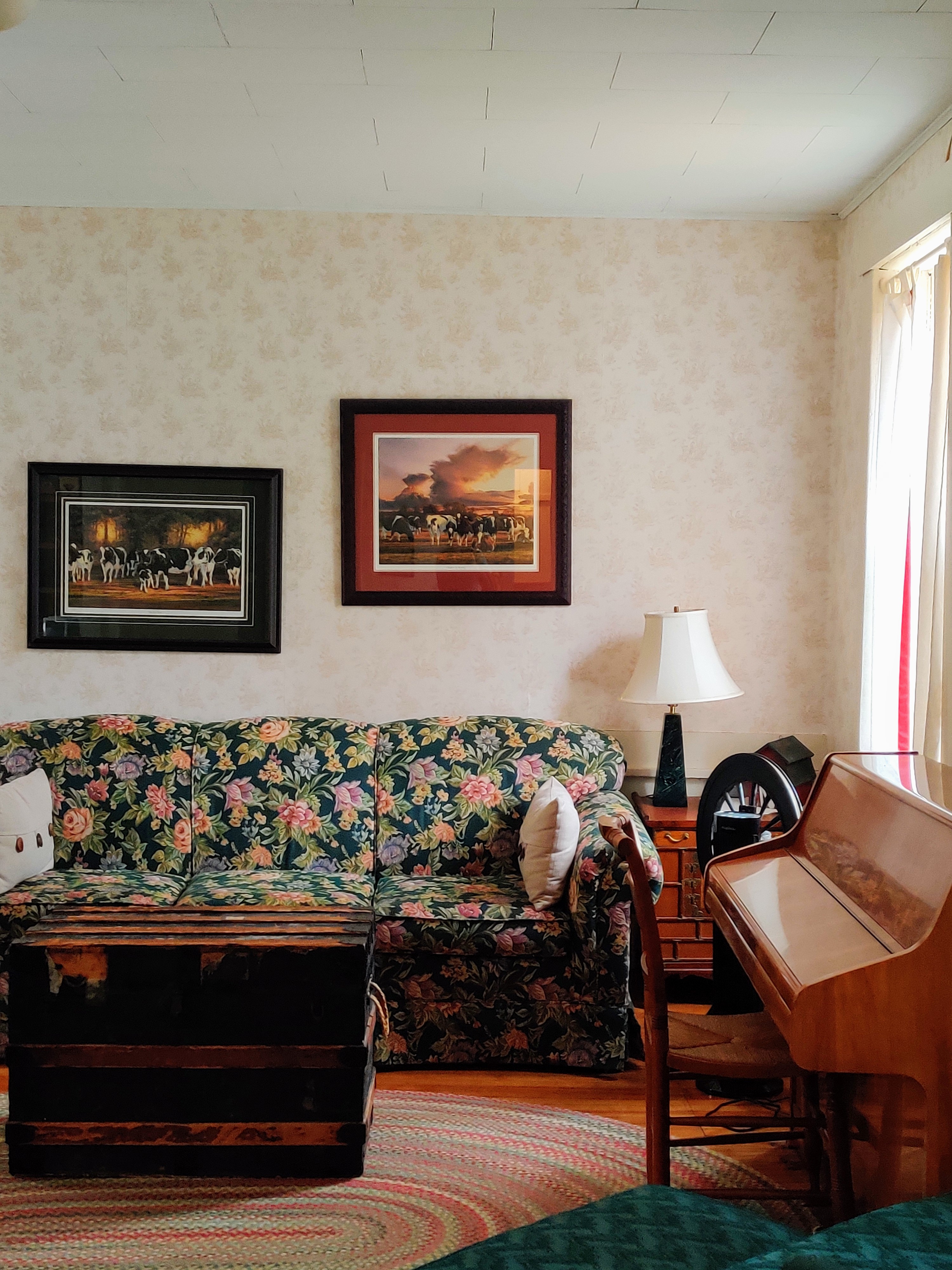
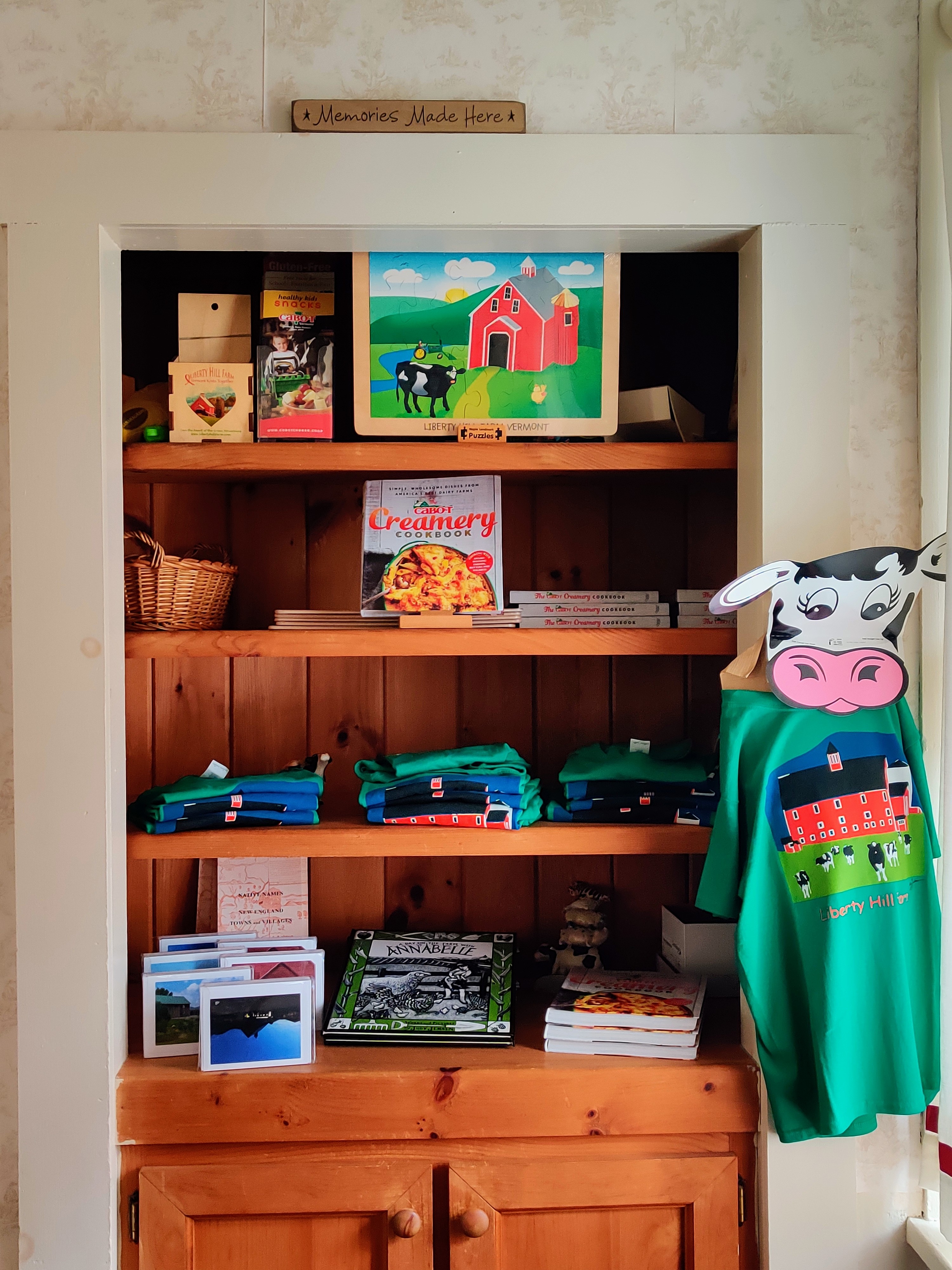
Their son David walks in on this cold fall night. He and some young high school boys were covering the harvest out in the fields. He was covered in mud and panting. When I peered outside, I noticed a huge tarp with hundreds of tires stacked on top of it. They were covering the crop so it could ferment over the winter protected without animals or the weather damaging it. The physical labor that goes into rolling tires up the tarp and covering the entire mound of crops is unimaginable!
When I asked her who some of her most memorable guests were she listed a few include Judge Arthur Garitty who was involved in the desegregation case in Boston, kids from the Lexington school of the deaf in Queens, a Sikh and the list goes on. Beth remembers every guest by name. She remembers every detail, every conversation, and every interaction with her guests. It’s incredible the memory she has. And the way she speaks about each guests it’s clear they’ve made an impact on her in some way and likewise she on them (I can attest to that). She never has a bad thing to say about anyone and her passion and love is evident in every conversation, in every gesture and in everything she does. She is truly a warm and positive energy to be around and that connects people together. Families return to Liberty Hill Farm & Inn year after year, kids meet and become life long friends, there are even people who have been returning to this Vermont Farm bed & breakfast for over 30 years. That’s how special a place this is. I can’t even put it into words, it’s something you need to experience for yourself.
Chapter 5: Muffin Compares to a Stay at this Vermont Farm Bed & Breakfast
Meal: Omellette, custard rhubarb, chocolate chip muffins
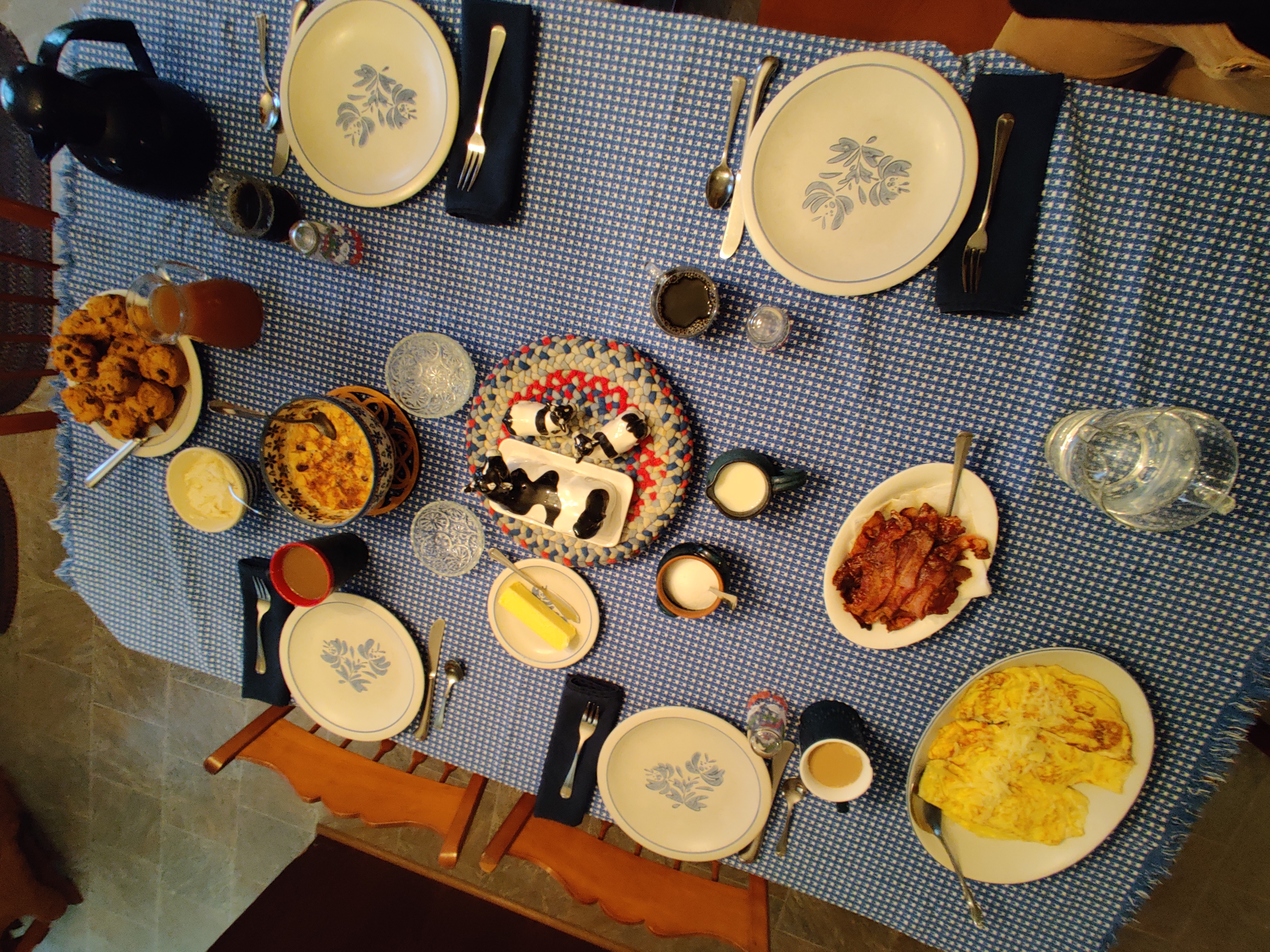
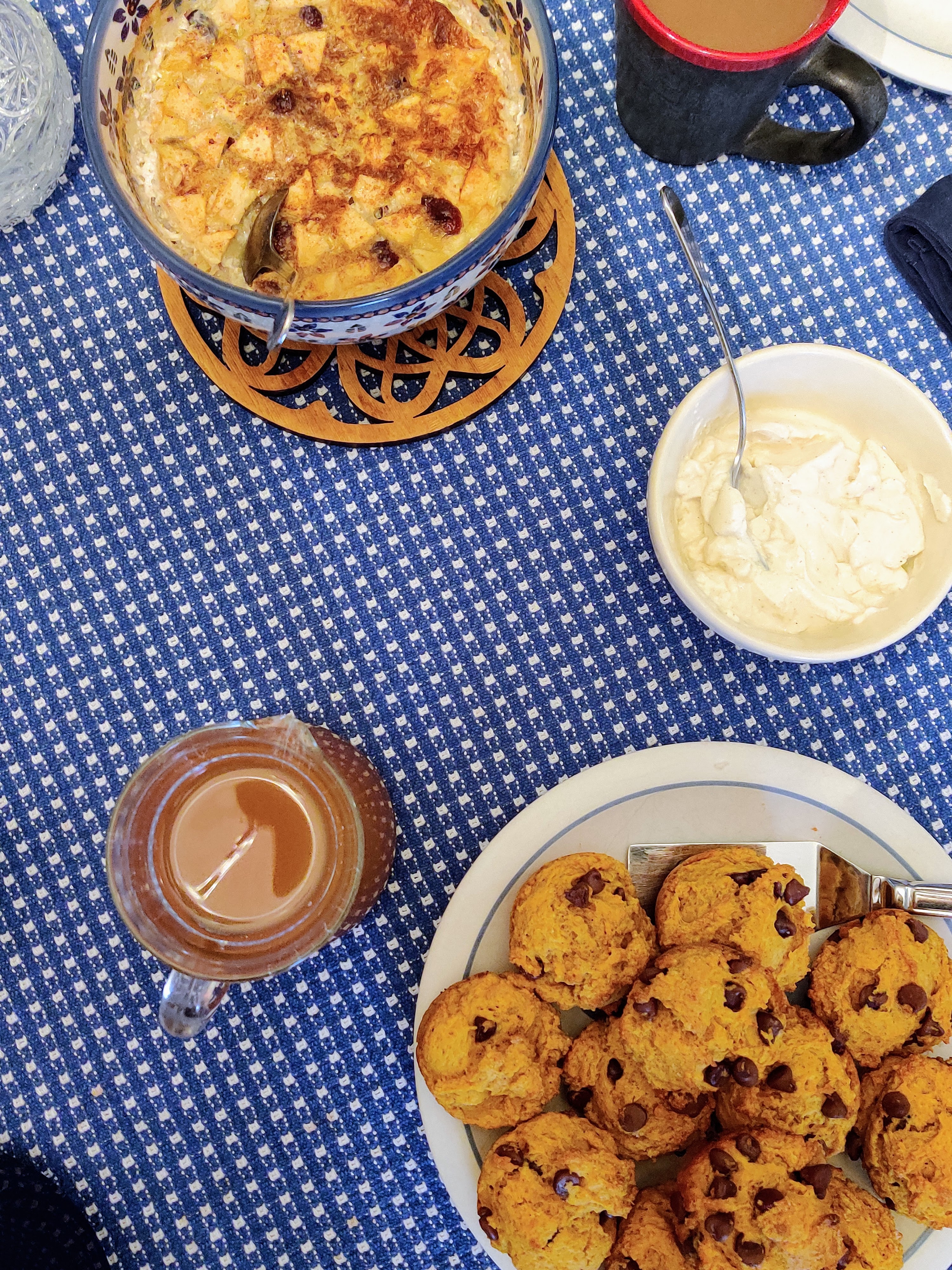
On our last morning, we chatted with Beth and a new group of guests who had just come up from South Carolina and Tennessee at the dining room table. She was talking to us about how she had attended and was asked to speak at a conference with a room full of men who literally milked 10,000 cows in their lifetime. She, as someone who had only milked 100 cows since she manages the latter side of the business, didn’t know what to say. What could she say that would resonate with these people? So she decided to show them gratitude and thanks for being a team, providing them with grain and helping her maintain her business. It was humbling to hear her – Beth – talk about gratitude. Beth and her family have gratitude for a lot in this world. They have more gratitude than any one else I’ve ever met. This made me think about how on the East Coast, near the cities, we have a harder time finding gratitude. We’re always comparing ourselves to others.
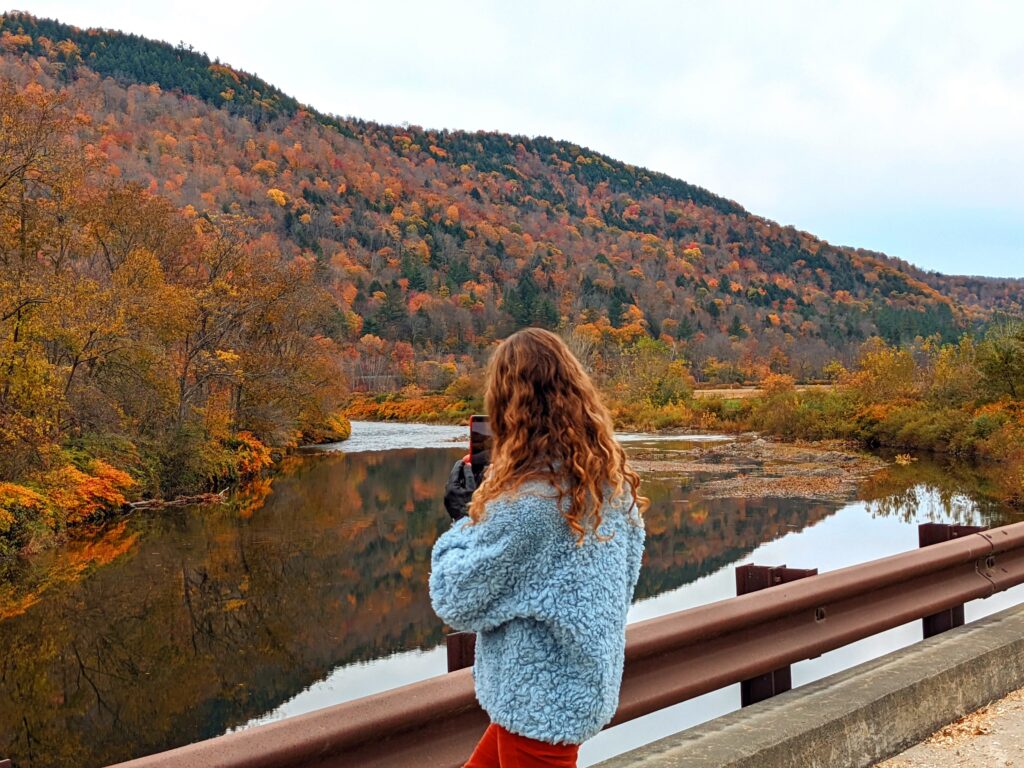
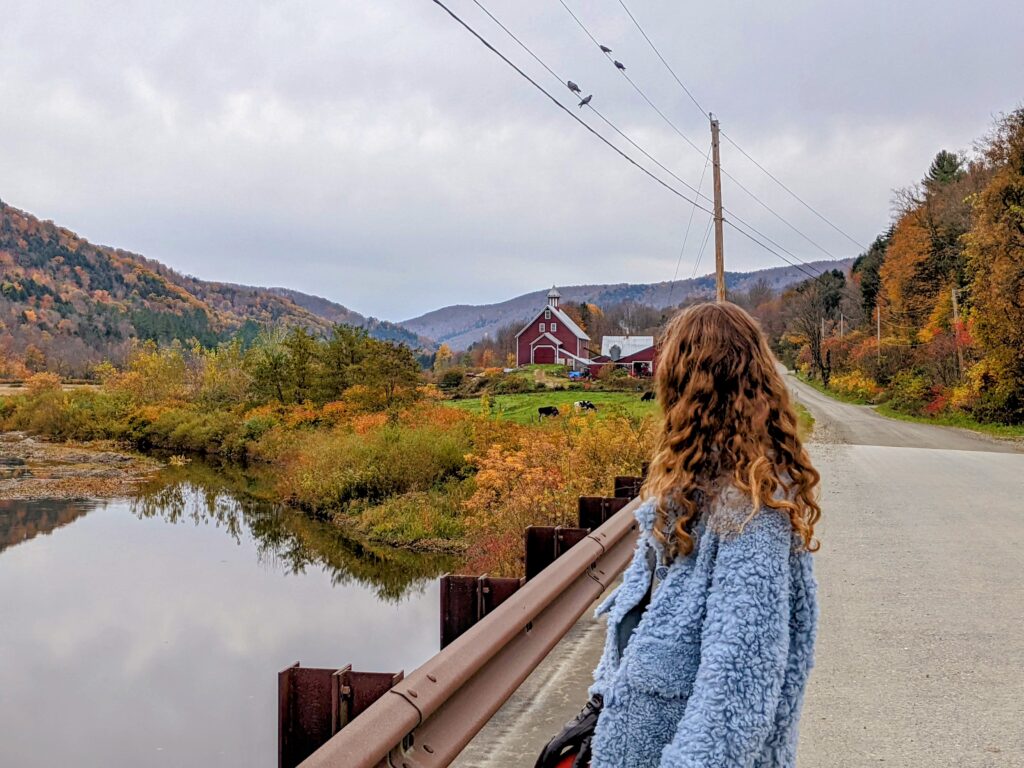
My takeaway from this trip is that farming can teach you a lot about gratitude. Gratitude is essential for living a life that is experienced as a good life. People who are grateful are happier, healthier, more energetic, more productive, more helpful, less anxious, less depressed and more resilient. All of this can be evidenced by Beth and her family. Gratitude connects you to something larger than yourself, whether that’s people, nature, and/or a higher power. So this Thanksgiving, I want to share my gratitude for farmers and everything they do for us day in and day out.
Over the years, Beth’s guest book at the entrance has filled with the fruits of these experiences. Guests share how much they enjoyed or needed to get away from their hectic life, disconnect from technology and reconnect with themselves and loved ones. Creative juices begin to flow. Guests read, take walks or hike the ROC Trail, swim in the summer, play games, paint, have wonderful conversations–all the pleasures in life needed to relax and unwind – at this secluded and transformational Vermont Farm bed & breakfast in the heart of Rochester, VT.
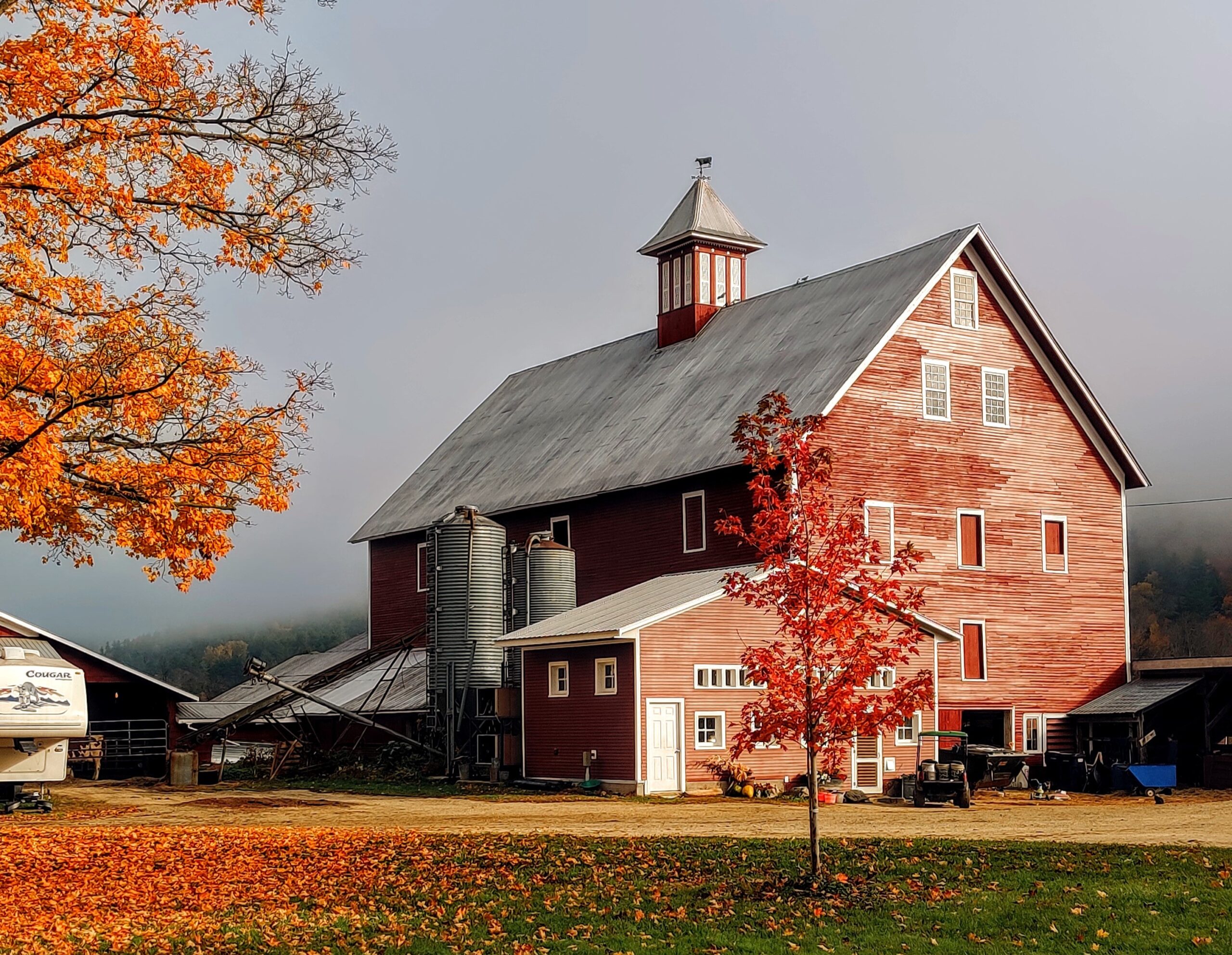
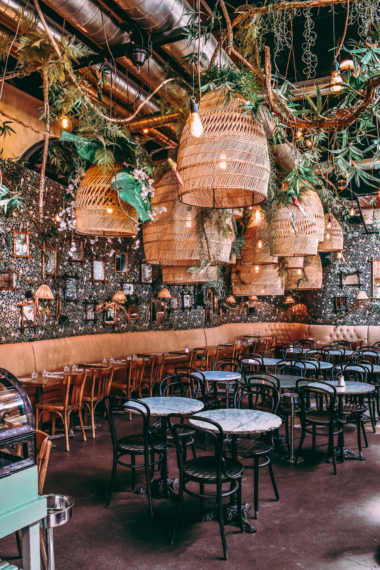

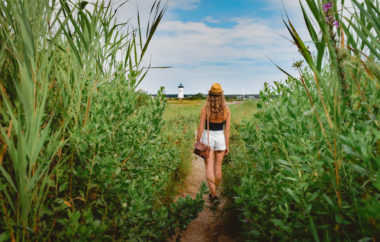


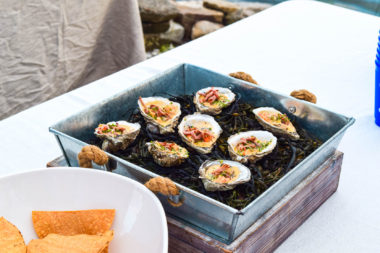

4 comments
Great article totally captured the magic of
Liberty Hill. The Kennett family are such loving, humble, authentic people who love what they do. We have been blessed to be their guests With our children & now grandchildren for over 30 years. Truly our favor vacation spot.
although never having been a guest at the liberty hll farm, i have met both beth and bob, once years back i deliverd metal roofing for a shed barn. just before reaching the farm i stopped to take in the view, west of rt 100 which i the view most see passing by.
friendly, kind ‘good’ people, i was invited into t big red barn to witness chores, meet the animals and for moment a sense of belonging.
every time i pass b i give thanks for finding this valley, and ‘home’
Wonderful article – Bob & Beth kENNETT and family are FIRST CLASS AMBASSADORS FOR VERMONT AGRICULTURE – THEIR HOME RADIATES THEIR LOVE FOR THE DAIRY IINDUSTRY AND WITHIN THE BARN CAN BE FOUND SOME OF THE FINEST COWS OF HTE BREED.
Hello! I’ve been following your website for some time now and finally got the courage to go ahead and give
you a shout out from New Caney Texas! Just wanted to tell you keep up the fantastic work!